Last Chance to Catch NYC's Holiday Notalgia Train
We met the voices of the NYC subway on our nostalgia ride this weekend!

Filming locations for all seasons of The Gilded Age, a period drama on HBO, can be found in NYC, Troy, Newport, and the Hudson Valley!

The lavish locations featured in the third season of The Gilded Ageare somehow even more spectacular than the first two seasons. The Gilded Age is a sumptuous period drama set predominantly in New York City, with filming locations all over the East Coast.
The Gilded Age was created, produced, and written by Julian Fellowes, who created the smash British hit Downton Abbey, so you’ll recognize some similarities — the drama between “upstairs and downstairs” and plucky outsiders breaking into societies unwilling to change.
Both shows use real-life events as plot points — in Downton Abbey, the sinking of the Titanic sets off the drama. In The Gilded Age, which begins in 1882, a young woman living in Pennsylvania named Marian Brook (played by Louisa Jacobsen) discovers that her father has squandered off his wealth and her inheritance, and she is forced to move in with her wealthy aunts in New York City.
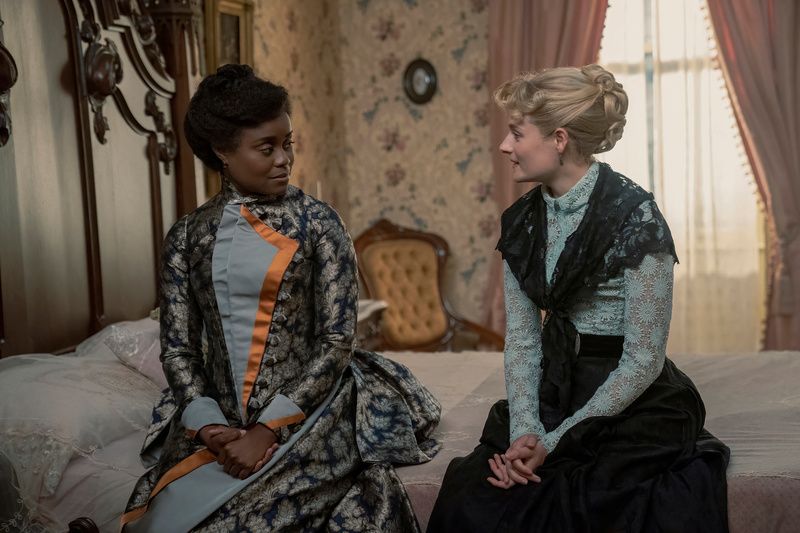
Now part of a wealthy family of Dutch descendants named the Van Rhijns, she comes across events that happened in real-life, from the arrival of the Statue of Liberty’s arm and torch in Madison Square Park to the opening of the Metropolitan Opera House and the Brooklyn Bridge, the rise of labor unions, and Booker T. Washington’s founding of the Tuskegee Institute. There’s also a main plot point inspired somewhat by the real-life drama between Mrs. Astor and Mrs. Alva Vanderbilt.
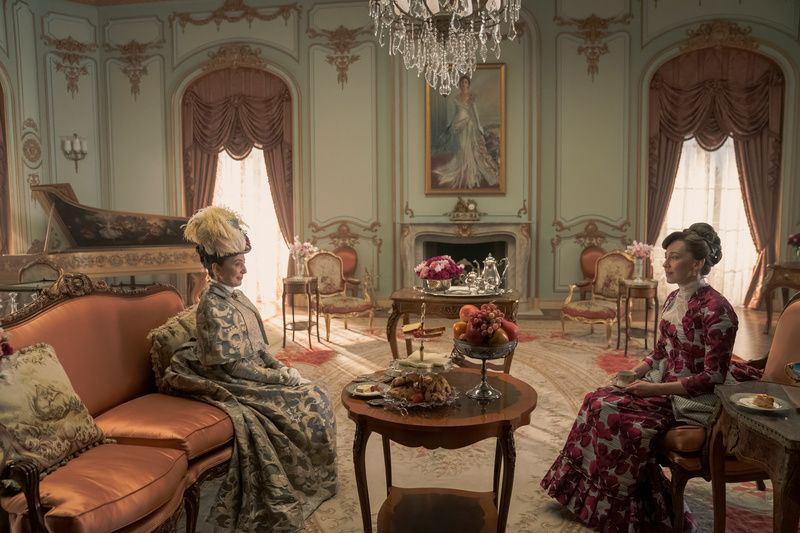
While Downton Abbey had Highclere Castle as the main setting, The Gilded Age needed to recreate many mansions of Gilded Age New York on a set, along with their summer “cottages” in Newport. Although a good number of Gilded Age Fifth Avenue mansions still stand, they are often intermixed with newer construction, so it is hard to recreate that world in New York City today. As such, the filming locations in The Gilded Age are a combination of real-life exteriors and interiors throughout New York State and in Newport, Rhode Island, as well as elaborate sets.
Large-scale period dramas are rarely filmed in the United States, with shows like The Alienist going all the way to Prague to recreate 19th-century New York City. The Gilded Age’s executive producer David Crockett says, “Whereas hundreds of years of history might be around every corner in most European cities, we had to put together a team to blanket New York City and other parts of the Northeast to find the pieces of the 1880s that both still existed and worked for our story. And for things we couldn’t find, we built them – like the full city block of 1880s 61st Street.”
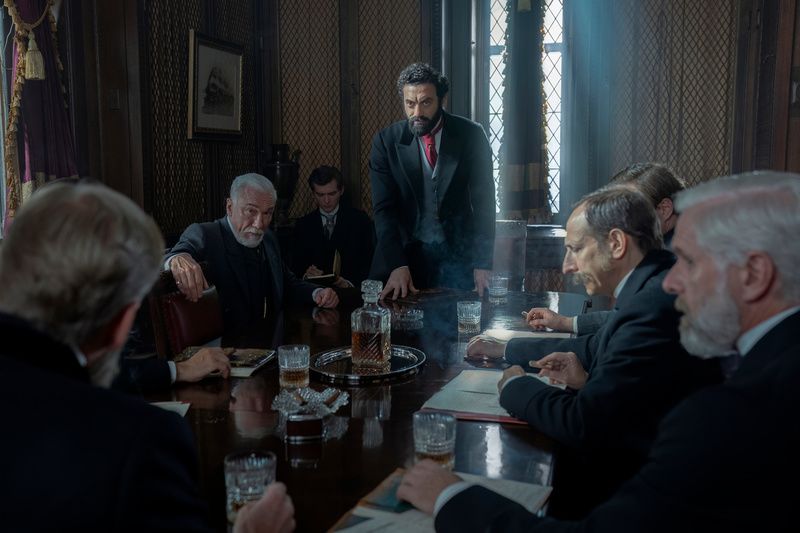
Below is a list of some of the gorgeous places featured in Season 3 (followed by locations seen in seasons 1 & 2). Beware of spoilers ahead!
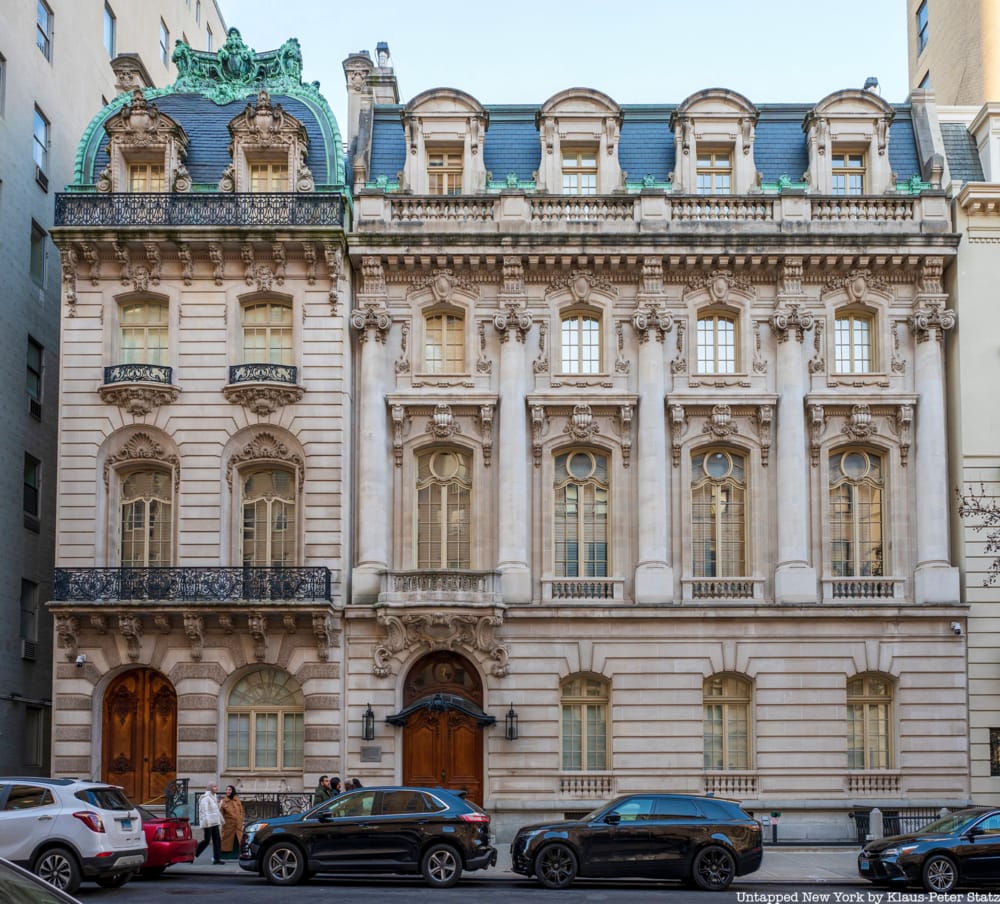
Admire the extant facades of Millionaire's Row and see stunning images of the opulent homes that have been lost while hearing about the scandalous goings-on inside.
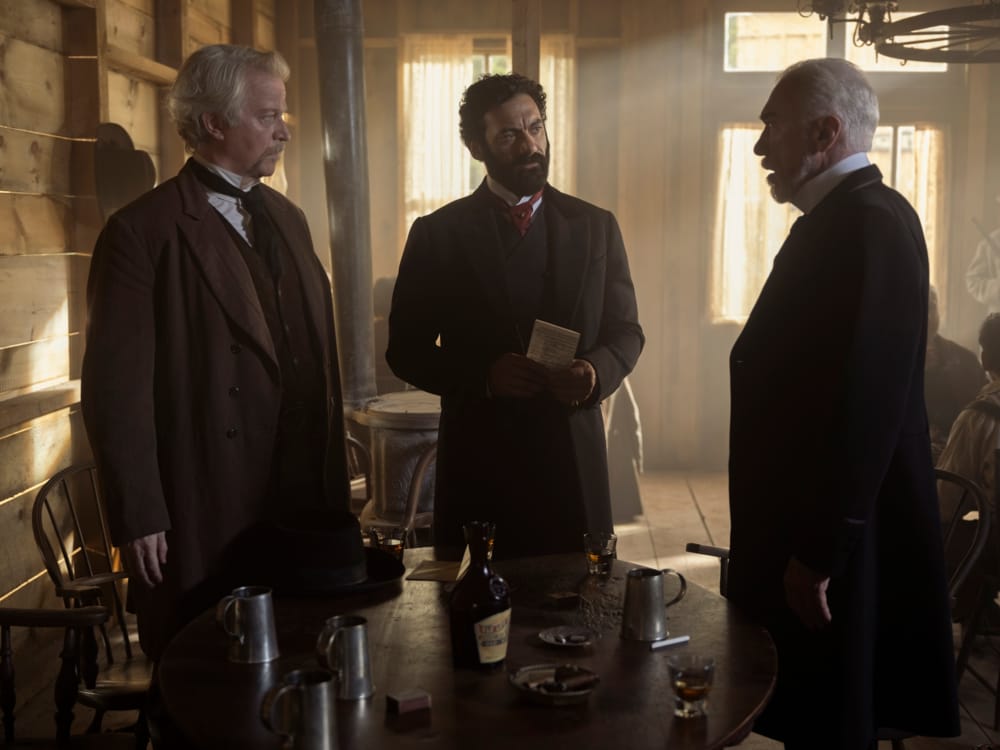
Episode 1 opens with George Russell arriving in Morenci, Arizona, where he intends to buy a bunch of mines to use the land to expand his railroads out west. Meanwhile, back in New York, the rest of the Russells and the Van Rhijns are enjoying a snow day. Both the western town and 61st Street exteriors are sets built on a backlot on Long Island. Production designer Bob Shaw told IndieWire that to build the western mining town, the crew took down a previous setup of a New Jersey ferry landing from Season 1.
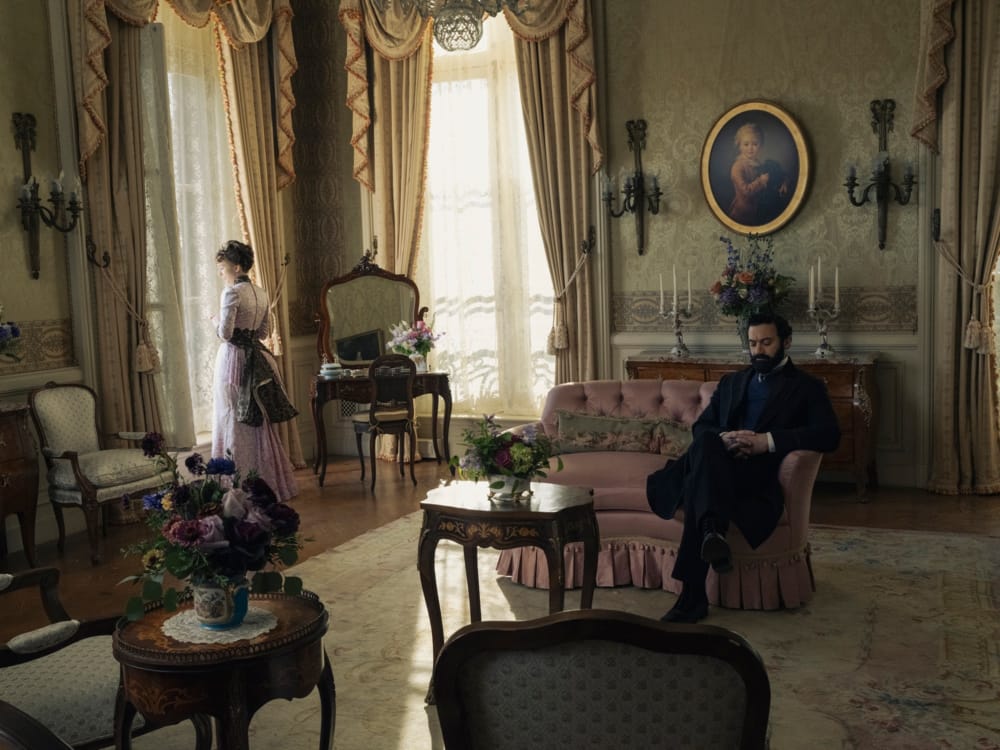
Several rooms and hallways at The Elms, a mansion in Newport, Rhode Island, built for Mr. and Mrs. Edward Julius Berwind, appear in this episode as parts of the Russell mansion. Edward Berwind made his fortune in the coal industry. He hired architect Horace Trumbauer to design a summer residence inspired by the 18th-century French Château d’Asnières. It was completed in 1901.
The dramtic opening shot of Episode 2 shows The Elms' red second-floor hallway and the servants' stairs. Gladys Russell's bedroom, which appears multiple times throughout this season, is Mrs. Berwind’s bedroom at The Elms.
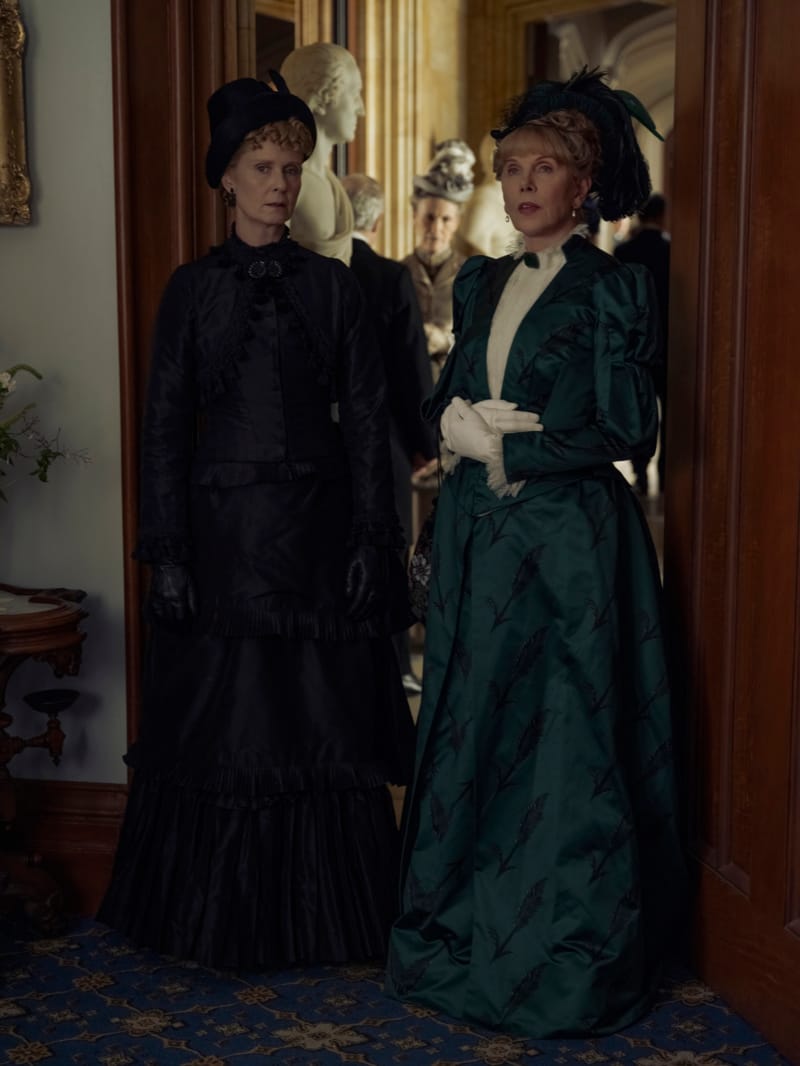
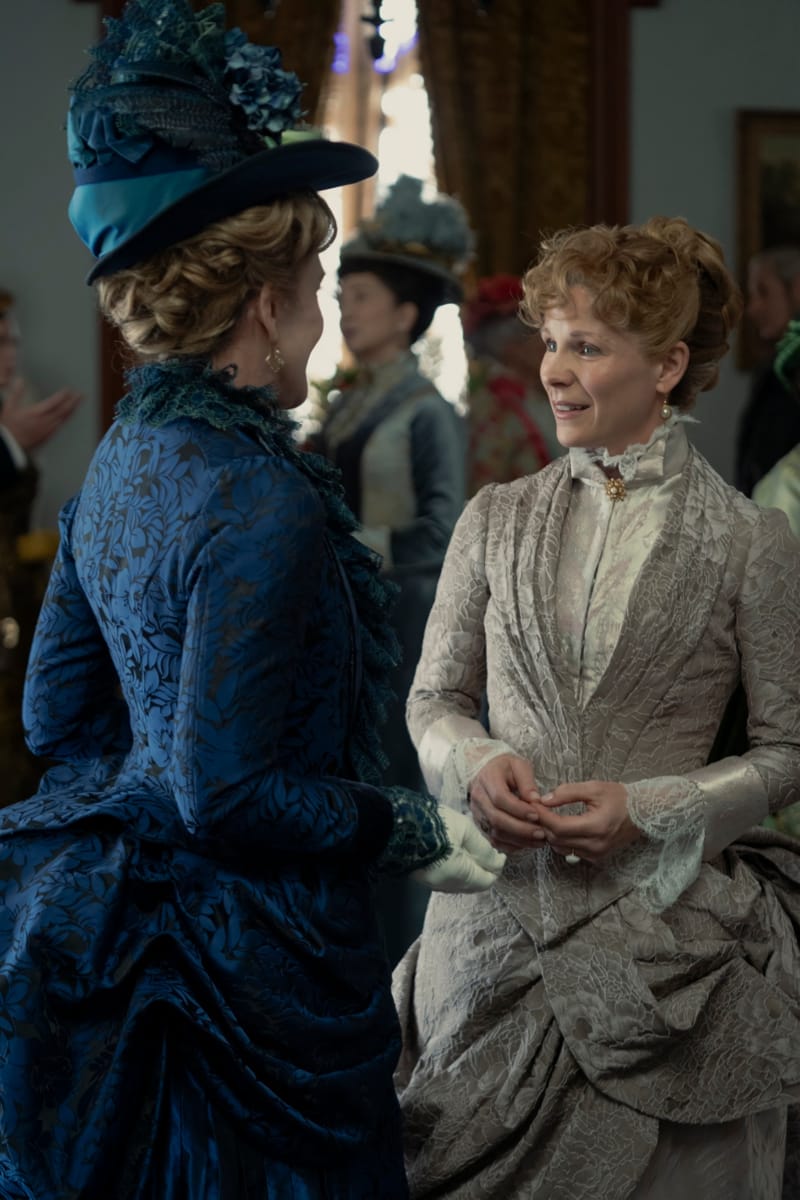
Aurora Fane's party takes place across various rooms inside Lyndhurst Mansion. Located in Tarrytown, New York, the home was designed by Alexander Jackson Davis for William Paulding Jr., a former mayor of New York City, in 1838. The castle-like structure appears in previous seasons, where the carriage house stands in for the offices of The New York Globe.
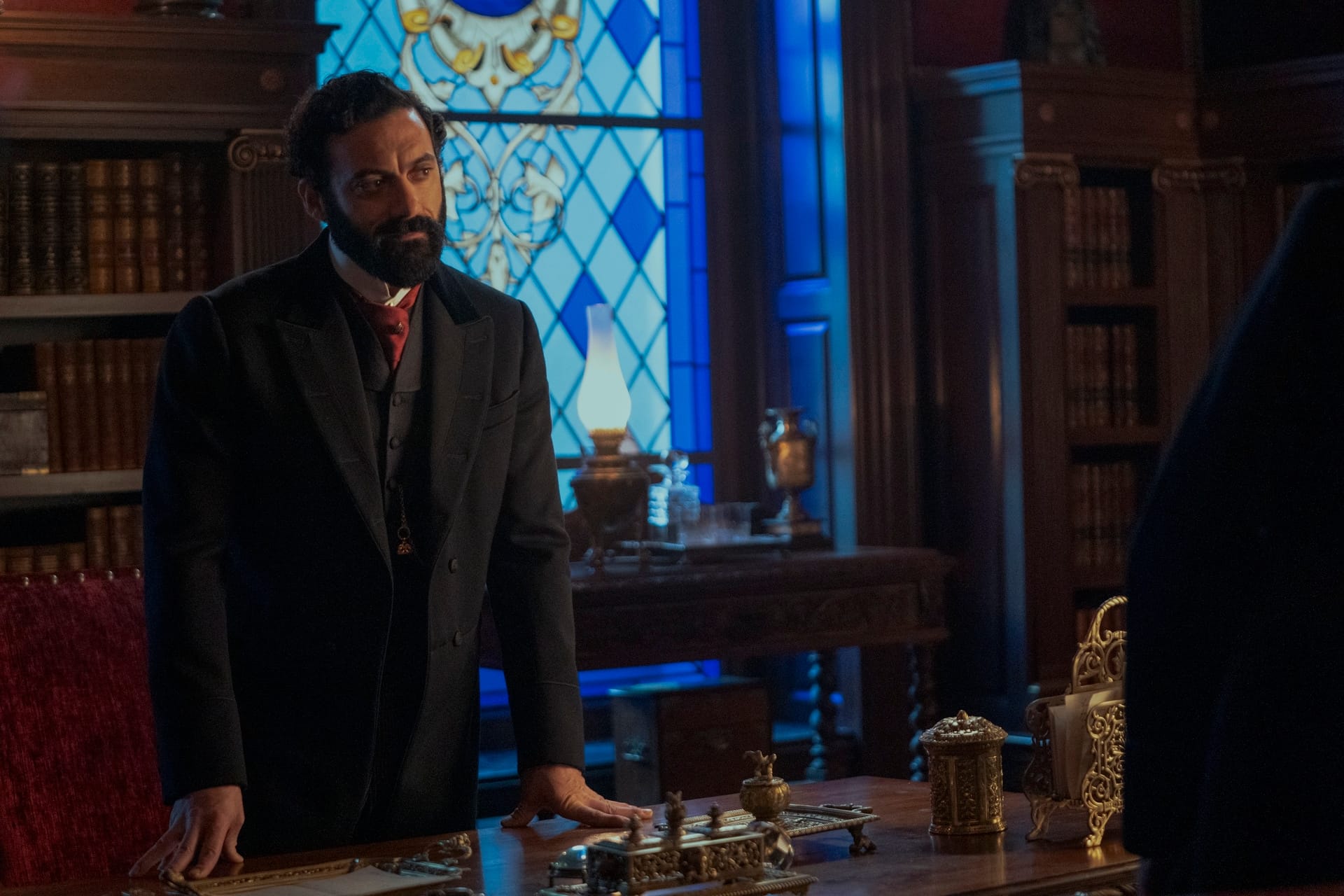
Scenes in George Russell's study are filmed in the library at Hempstead House, in Sands Point on Long Island. It is one of four mansions that constitute the Guggenheim Estate, built for Howard Gould, son of the railroad tycoon Jay Gould, in 1912. The massive 50,000 square-foot, Tudor-style mansion (with 40 rooms!) will appear again in later episodes...
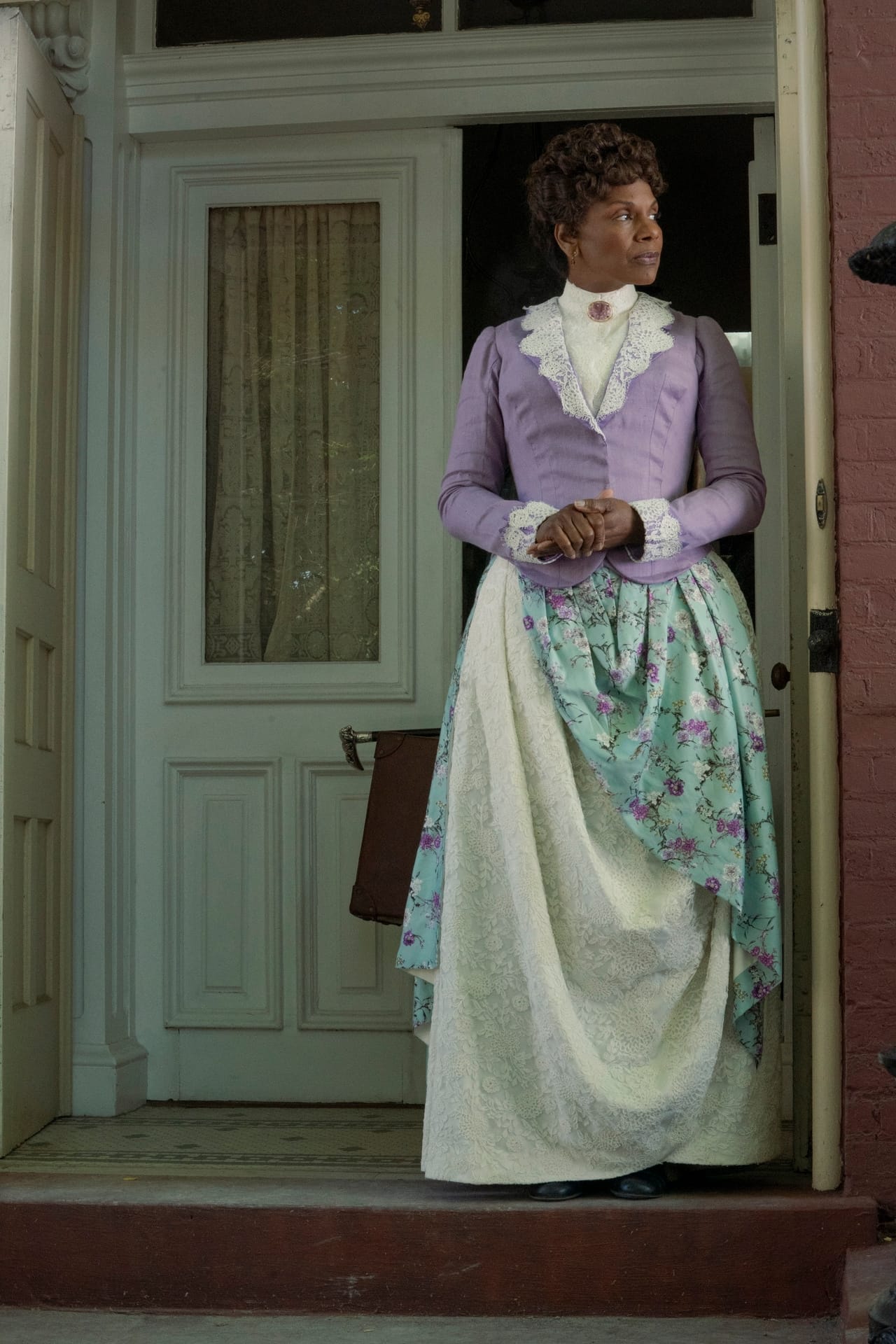
When Peggy goes to visit her cousin Athena in Newport, we see the exterior of a painted red brick home. In reality, that home is located in Schenectady's historic Stockade District. The house at 25 Washington Ave is known as the Giles Clute House and was built in 1820. This historic area appears many times throughout the series.
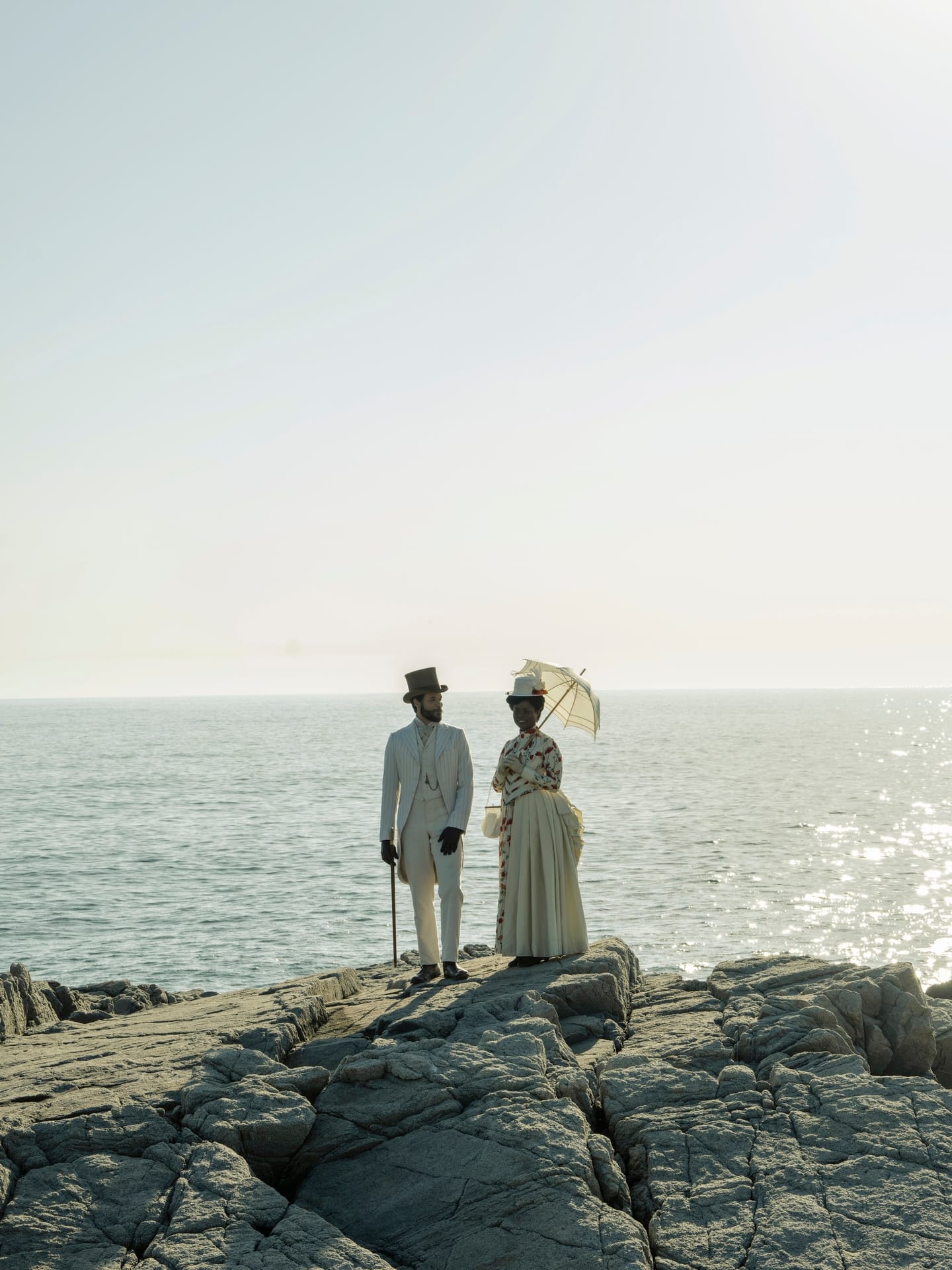
Newport does appear on screen when Peggy and Dr. Kirkland go for a stunning stroll along The Cliff Walk. This 3.5-mile stretch of coastline is a popular pathway that snakes past the area's grand mansions.
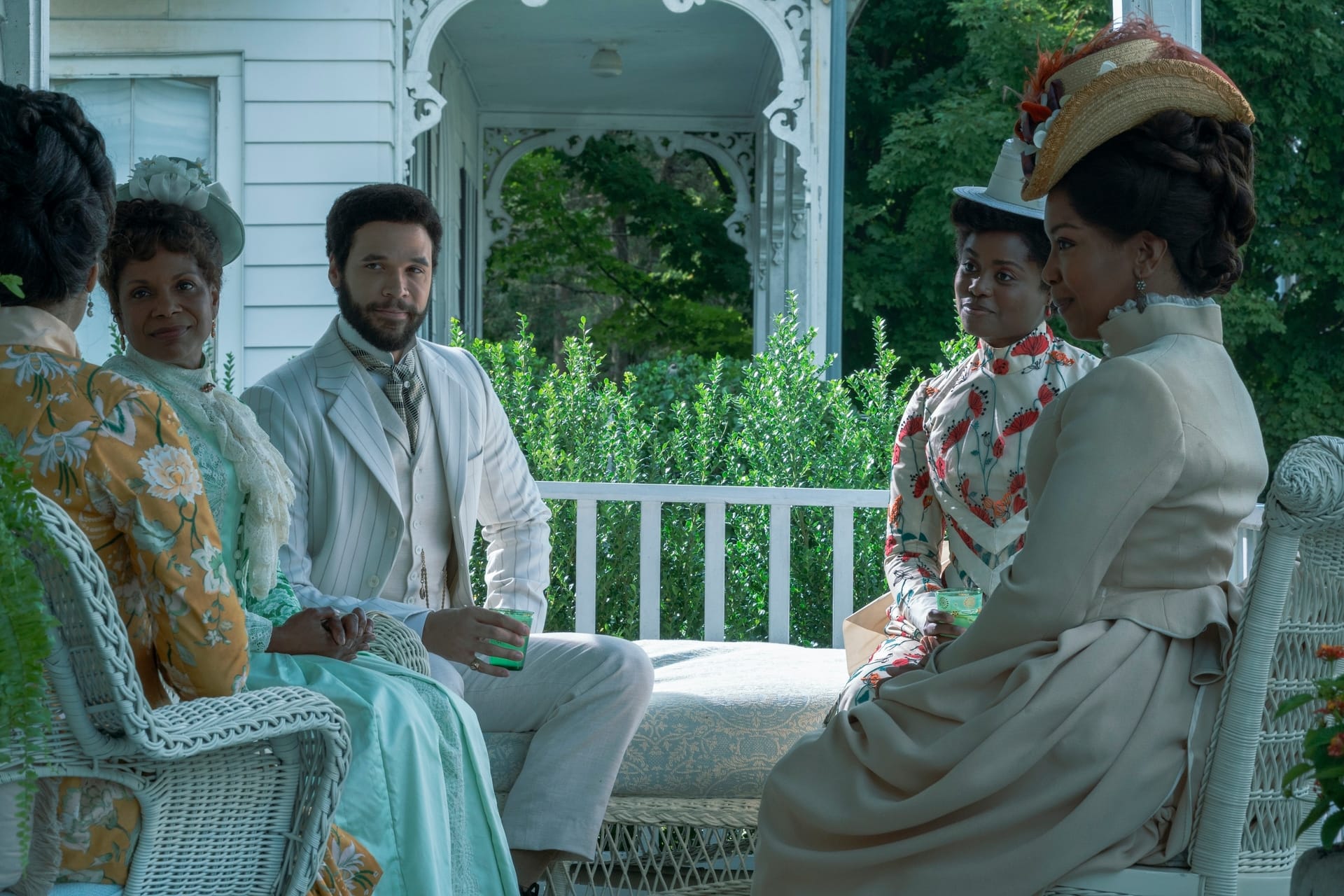
Troy, New York, is another Hudson Valley region town that stands in for Newport this season. The home used as an exterior for the Kirkland's residence is a bright Victorian with a porch where the characters on the show enjoy some lemonade.
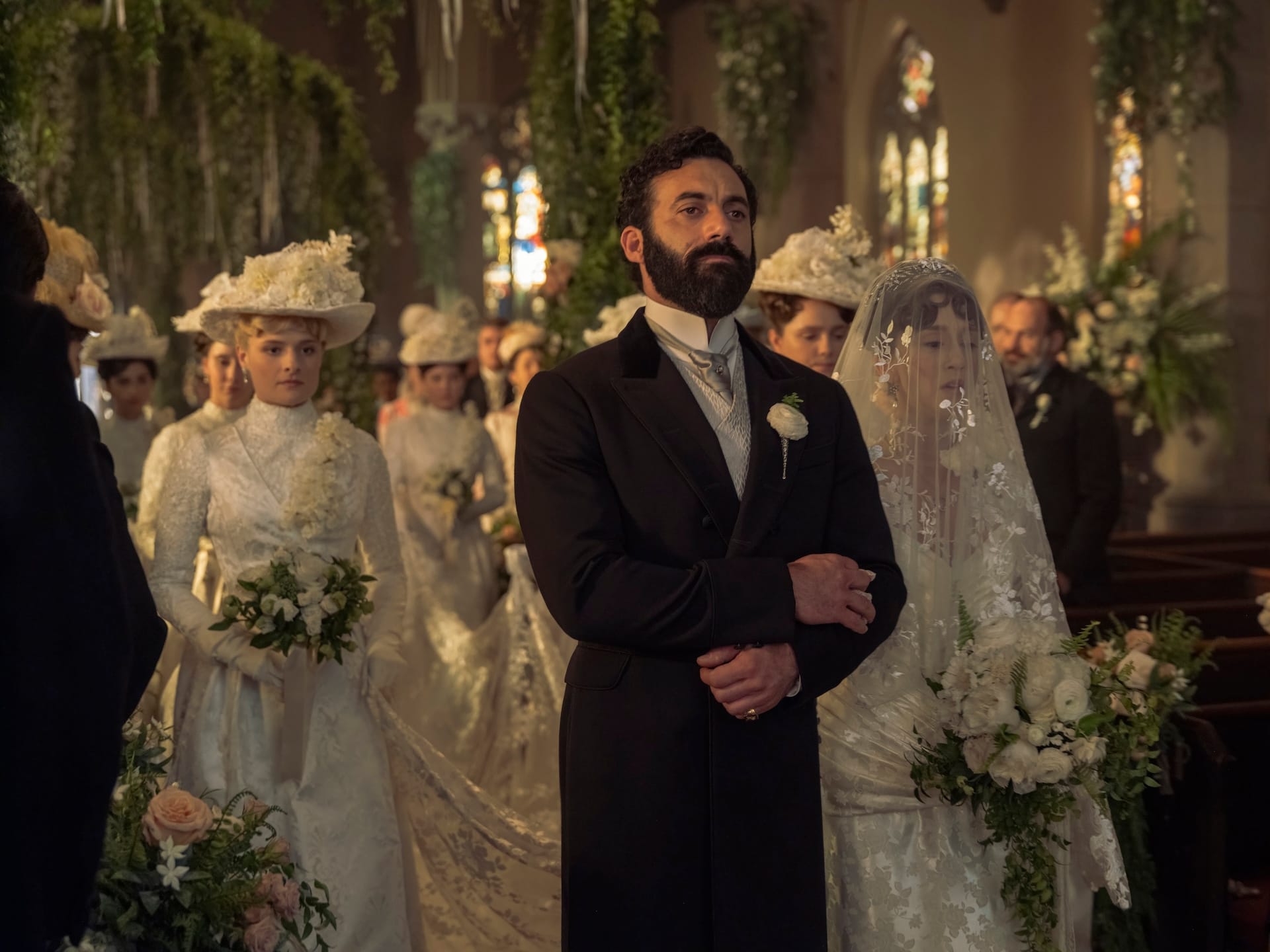
Episode 4 brings with it what Mrs. Russell hopes will be "the wedding of the century," Gladys' marriage to the Duke. The ceremony takes place at St. Thomas Episcopal Church at 53rd Street and Fifth Avenue in the show. We first see this location in Season 2 when the characters attend Easter Service. The wedding scenes were shot inside St. Peter’s Episcopal Church in Albany.
Gladys' storyline greatly resembles the true life of Consuelo Vanderbilt, one of New York's "Dollar Princesses." Consuelo, the daughter of Alva and William Kissam Vanderbilt II, was pushed into marrying the Duke of Marlborough, though she was really in love with someone else. Read more of her story here!
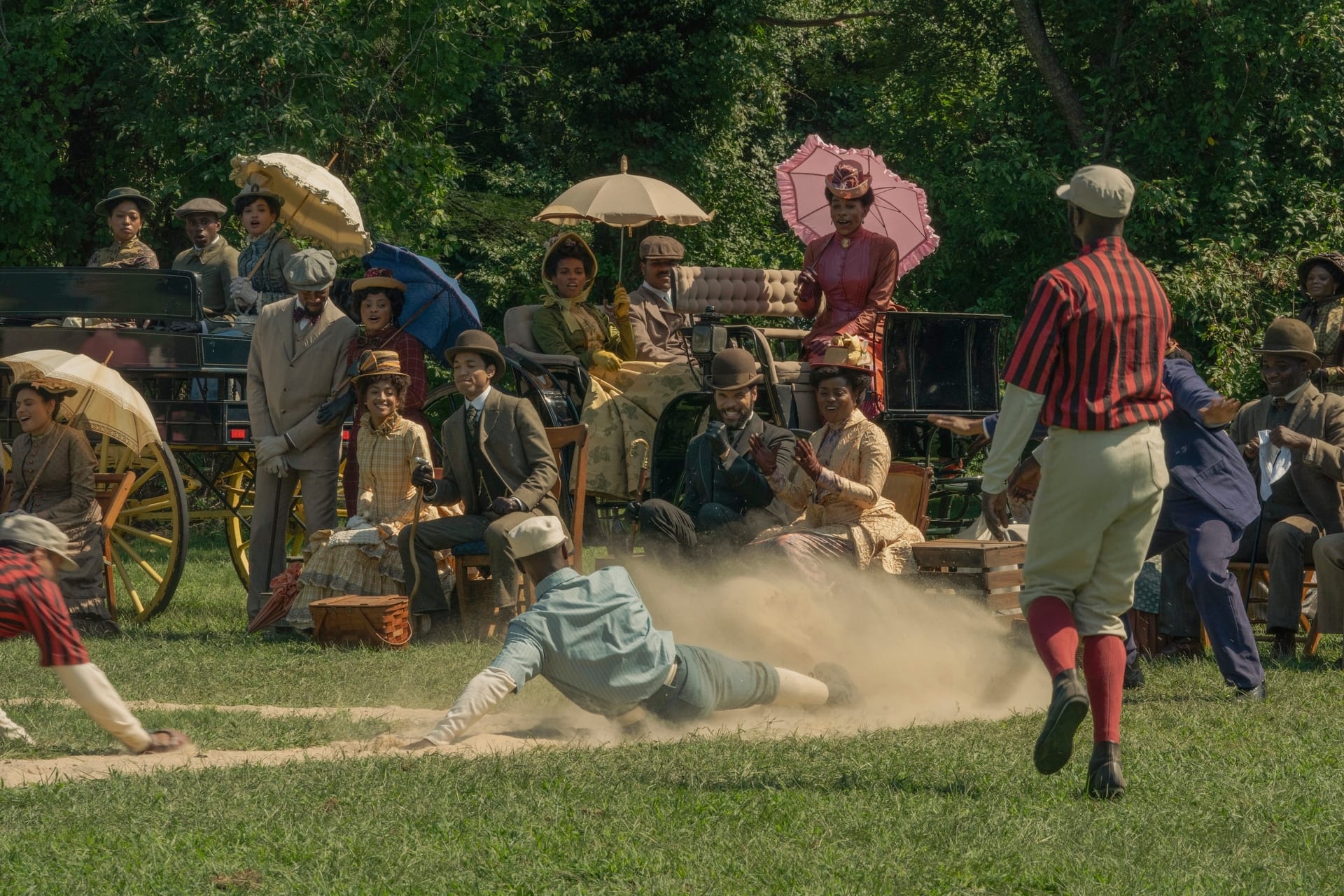
Peggy and Dr. Kirkland take part in a classic American pastime, watching a baseball game! The sport was already popular by the time the show takes place, and there were many fields around New York City; however, baseball leagues were racially segregated. Check out this list of Black baseball sites in New York City for some possible locations the show drew inspiration from.
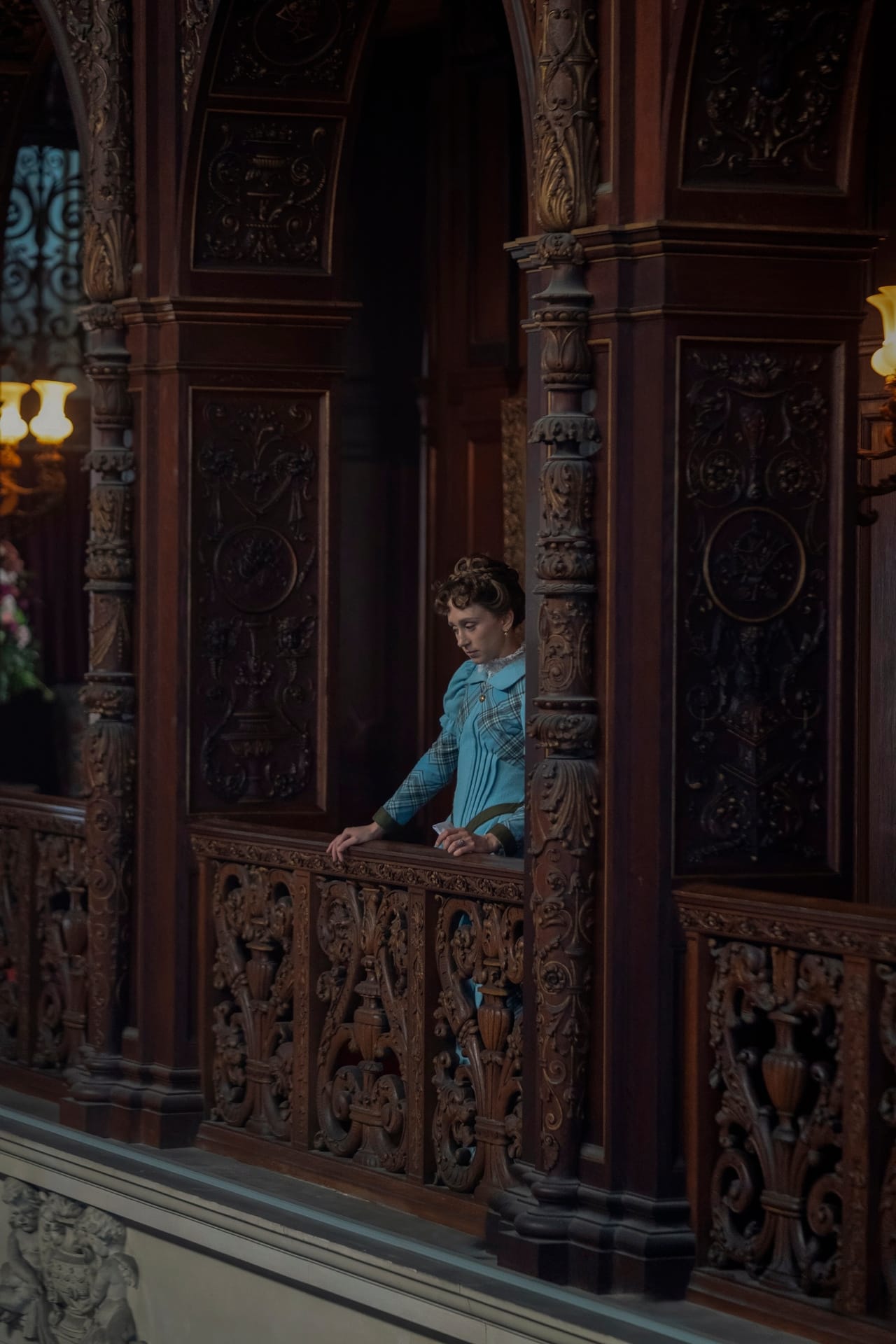
Viewers get a tour of the Duke's estate as he and his sister tour Gladys around the home, showing off portraits of the family and revealing some of the less ideal facets of living in an aged country estate (mice). Production didn't hop the pond to shoot these scenes, though. Ochre Court, the second largest Newport mansion behind The Breakers, serves as the English estate. Visual effects were used to change the mansard roof into an English-style roofline. Designed by Richard Morris Hunt for Ogden Goelet and completed in 1892, the mansion is now part of Salve Regina University. The opulent dining room appears in the next episode.
Other parts of the estate in the show, such as Gladys' English bedroom, were shot at Belcourt Mansion in Newport. The bedroom in the show is actually Belcourt's drawing room.
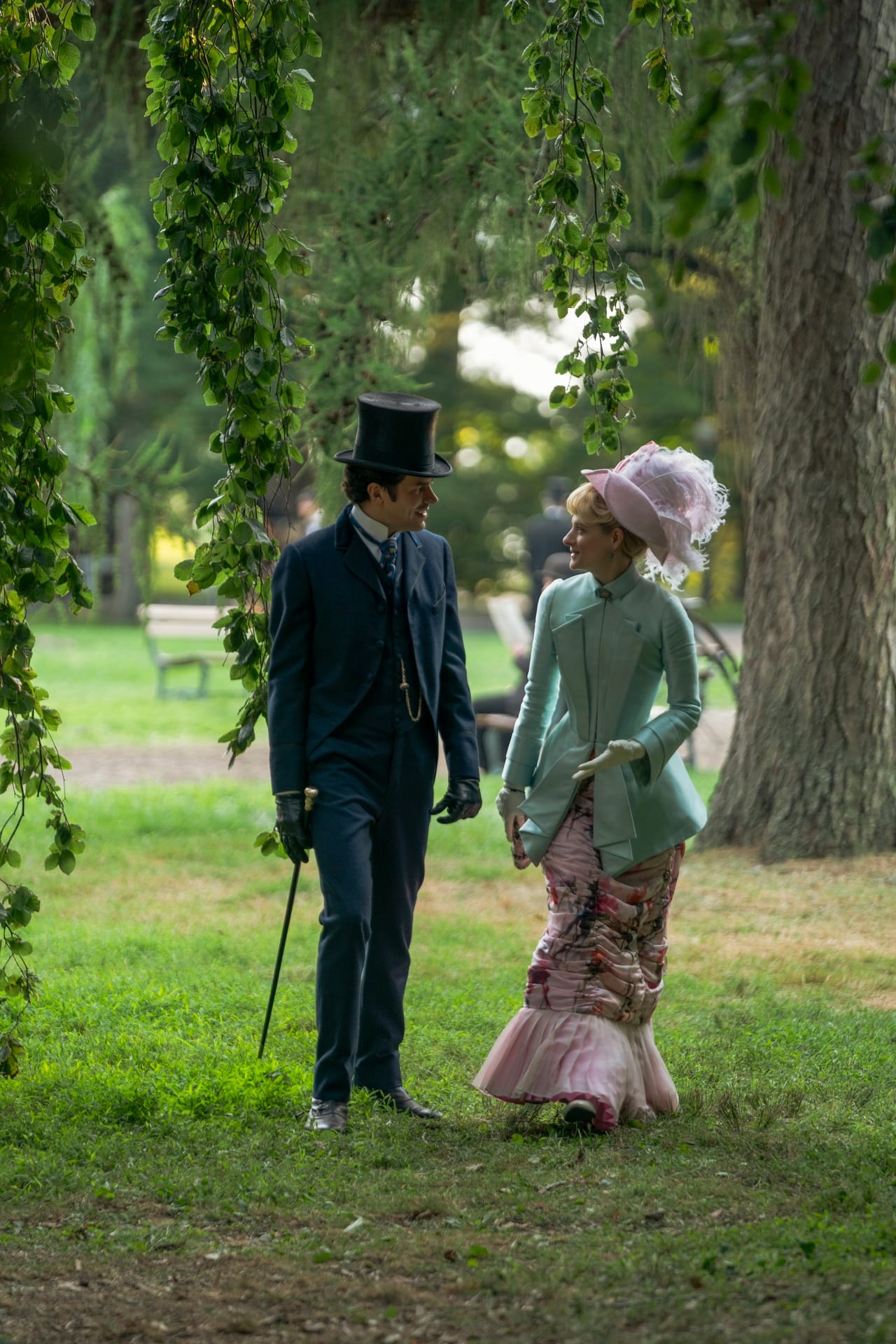
A lush Weeping Beech tree we are to assume is in Central Park in the show, can actually be found on the grounds of Lyndhurst Mansion. The cascading leaves provide one of the perfect romantic spot for Larry's proposal to Marian.
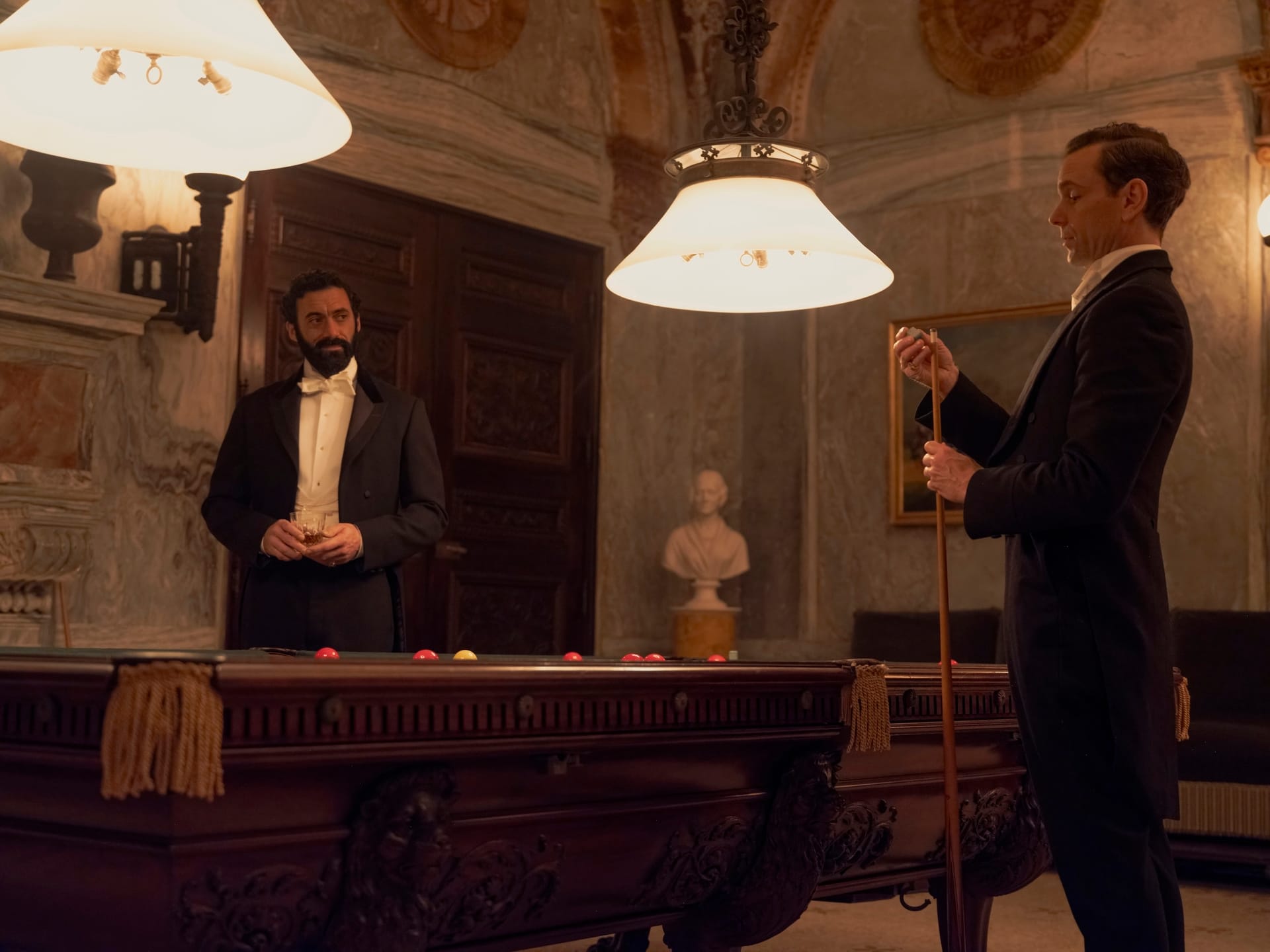
The Billiard Room at The Breakers, the Vanderbilt mansion in Newport, Rhode Island, makes a return appearance as George Russell's billiard room.
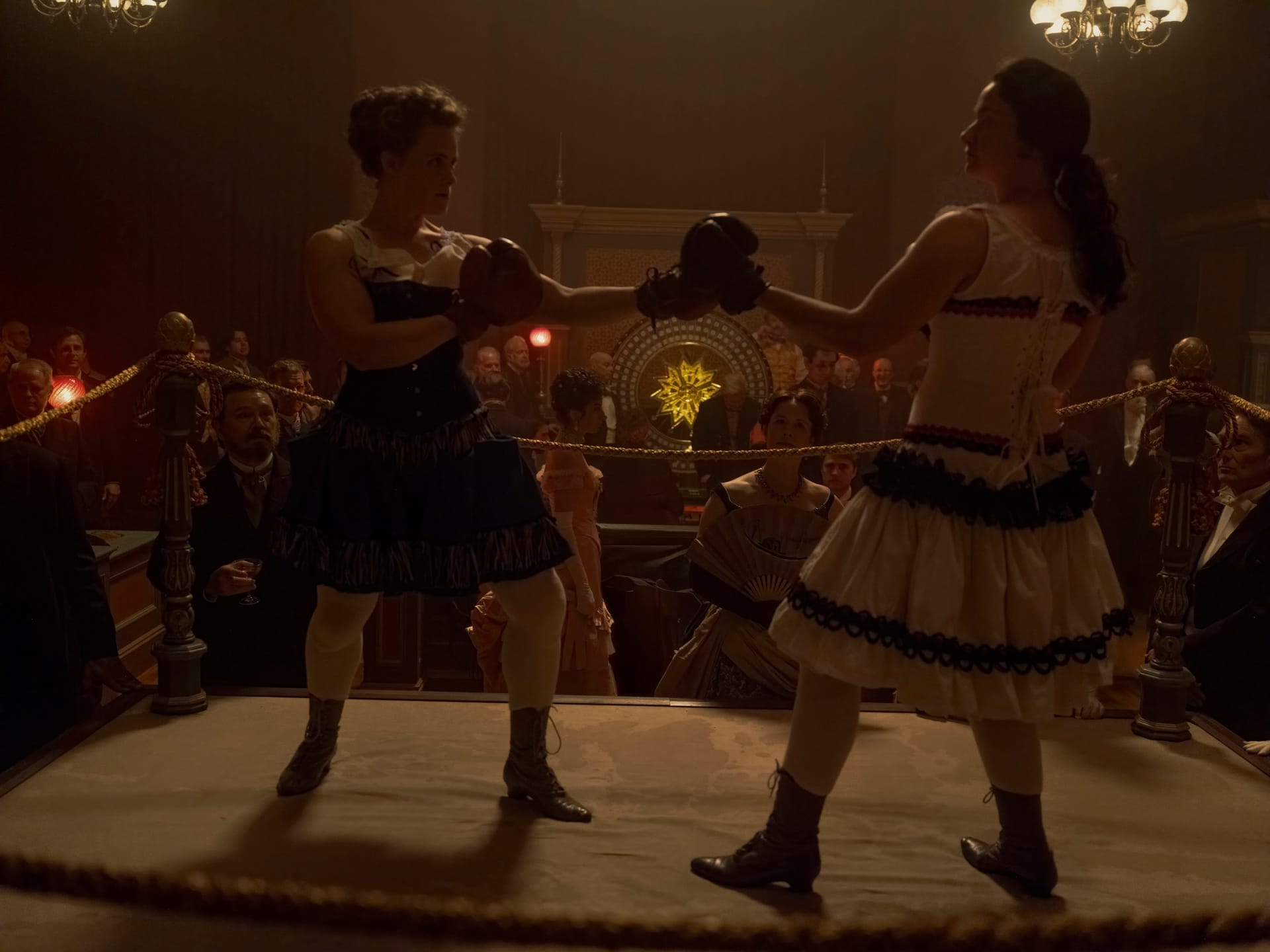
The Haymarket was a real place in Gilded Age New York. Located at 66 West 30th St. at Sixth Avenue, it was in the heart of Manhattan's vice district, the Tenderloin. Here, New Yorkers could find dance halls, gambling dens, brothels, and all sorts of sordid activities.
The show recreates The Haymarket inside Lark Hall, an events venue in Albany at 351 Hudson Avenue. The Youtube channel Film Trails and various photos posted on Facebook during filming in August 2024 show the production crew outside the venue. Lark Hall was built for the Daughters of the Eastern Star in 1916 as a chapter room, meeting space, and performance hall.
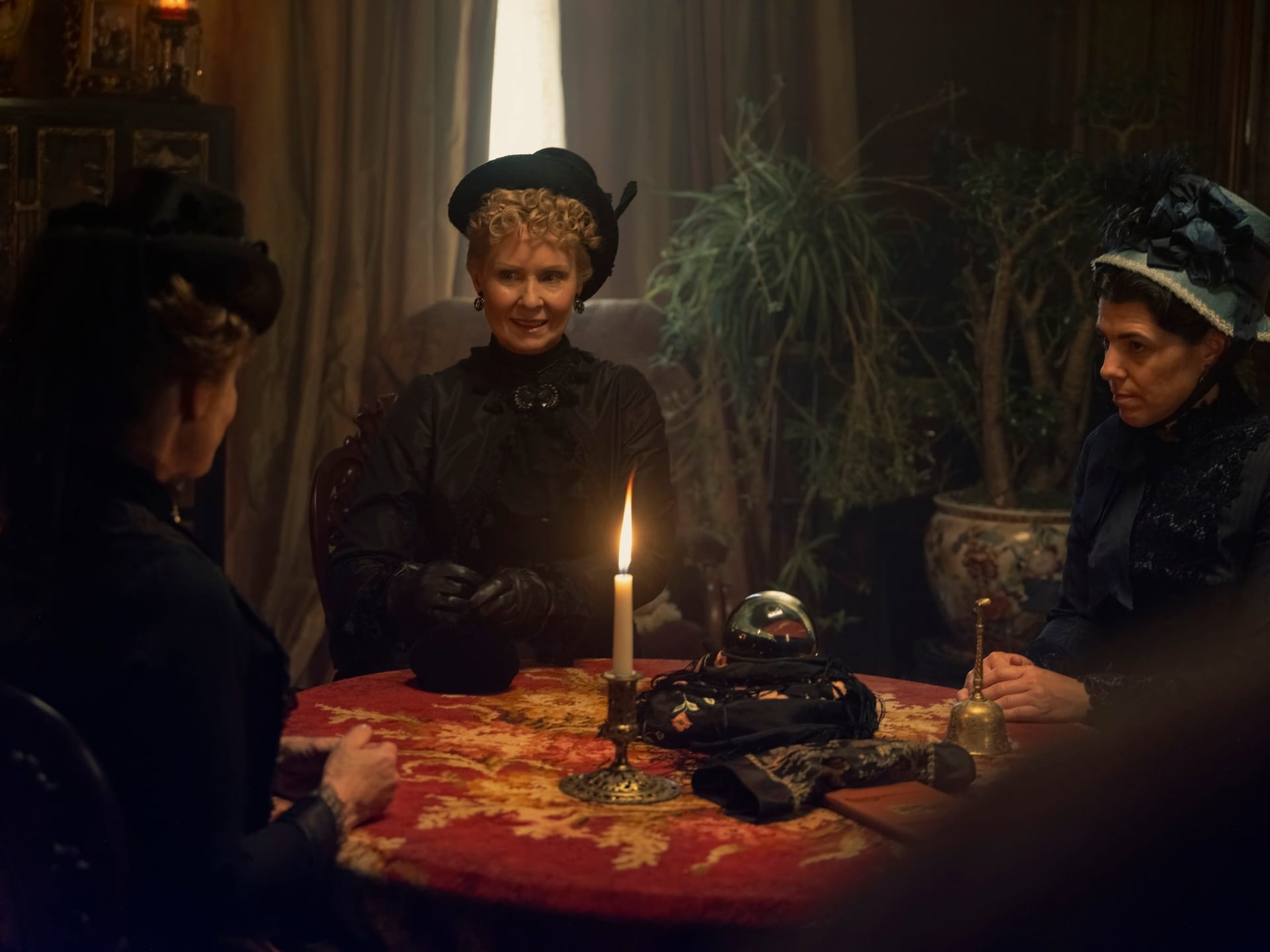
Grieving her husband, Aida turns to a form of solace sought by many widows of the 19th century, spiritualism. She visits the medium Madame Dashkova, who claims to be able to communicate with the late Mr. Forte. The interior scenes were shot at a historic home in the Washington Park neighborhood of Troy, New York, right next door to the house that stands in for the Brooklyn home of the Scotts.
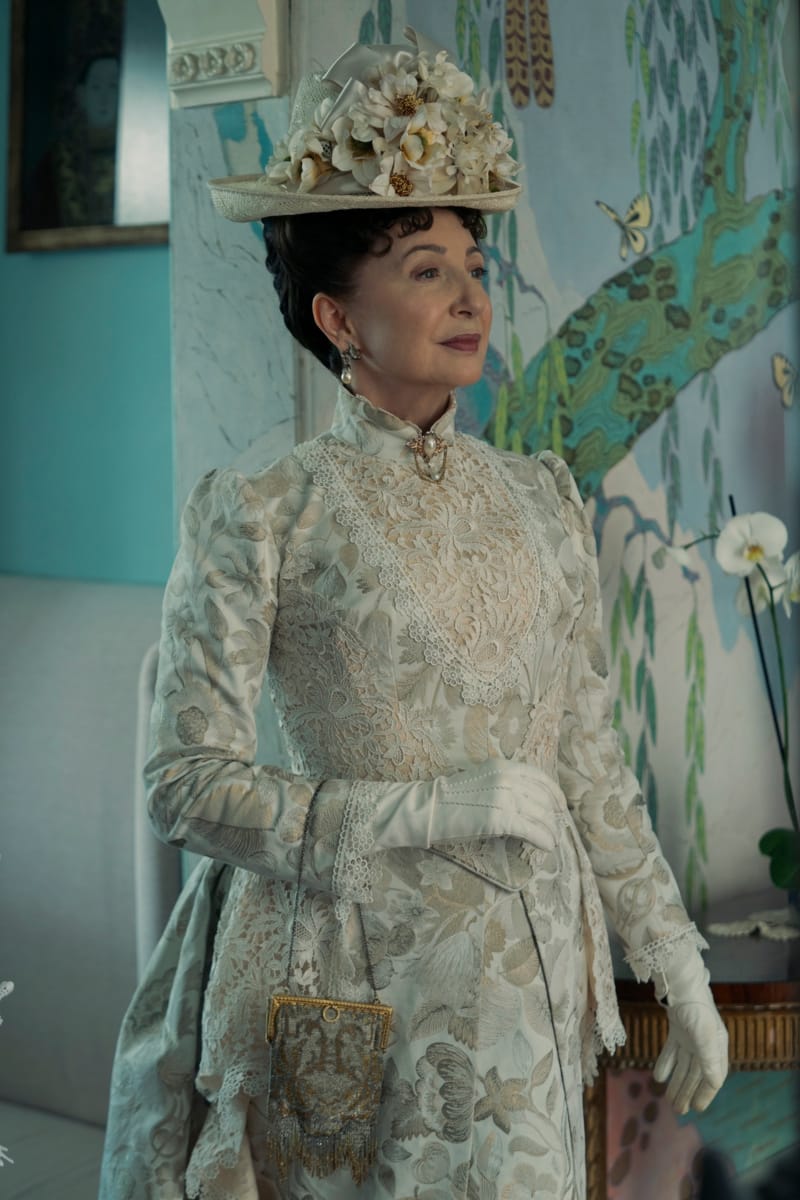
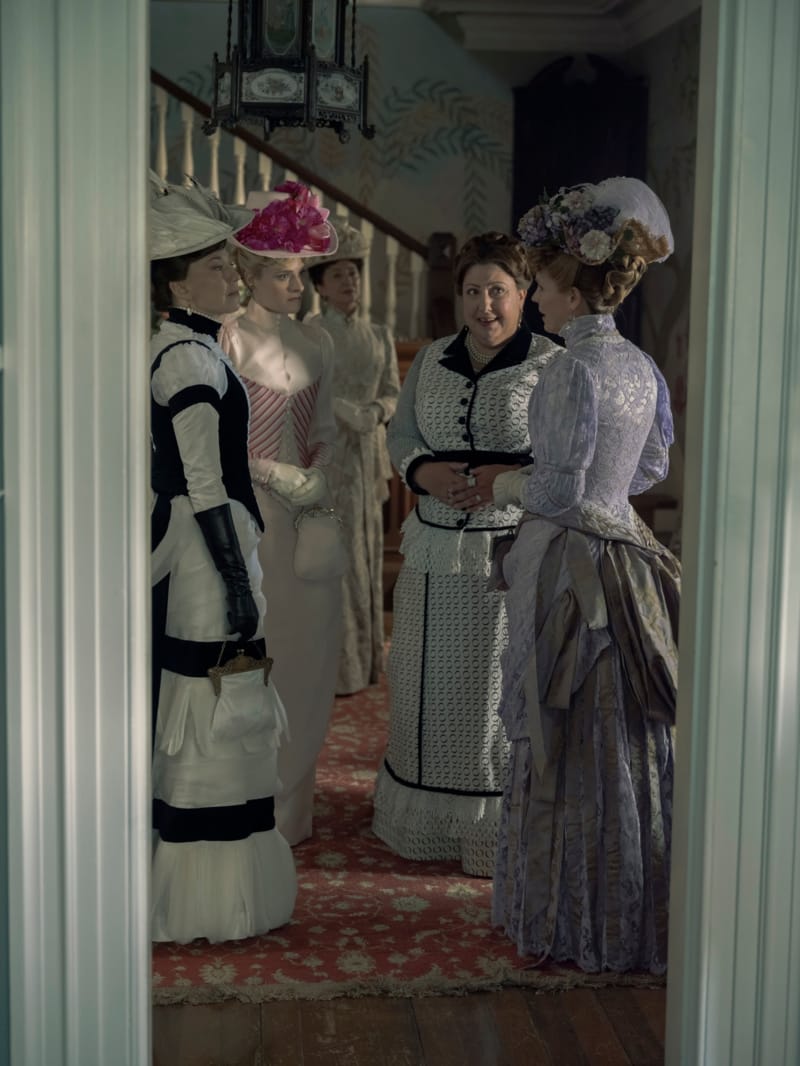
Photographs by Karolina Wojtasik/HBO
Mrs. Fish opens the Newport season with a luncheon that proves rather uncomfortable for Mrs. Fane, who must contend with rumors of her impending divorce. In their fanciful dresses, the women mill about in a room covered in painted walls with images of butterflies, leaves, branches, and vines. This room is part of The Ledges, a Newport mansion built in 1867 as a summer retreat for Boston-based merchant Robert M. Cushing. The murals were painted by his son, painter Howard Gardener Cushing. Cushing descendants still retain ownership of the property and use it as a private residence.
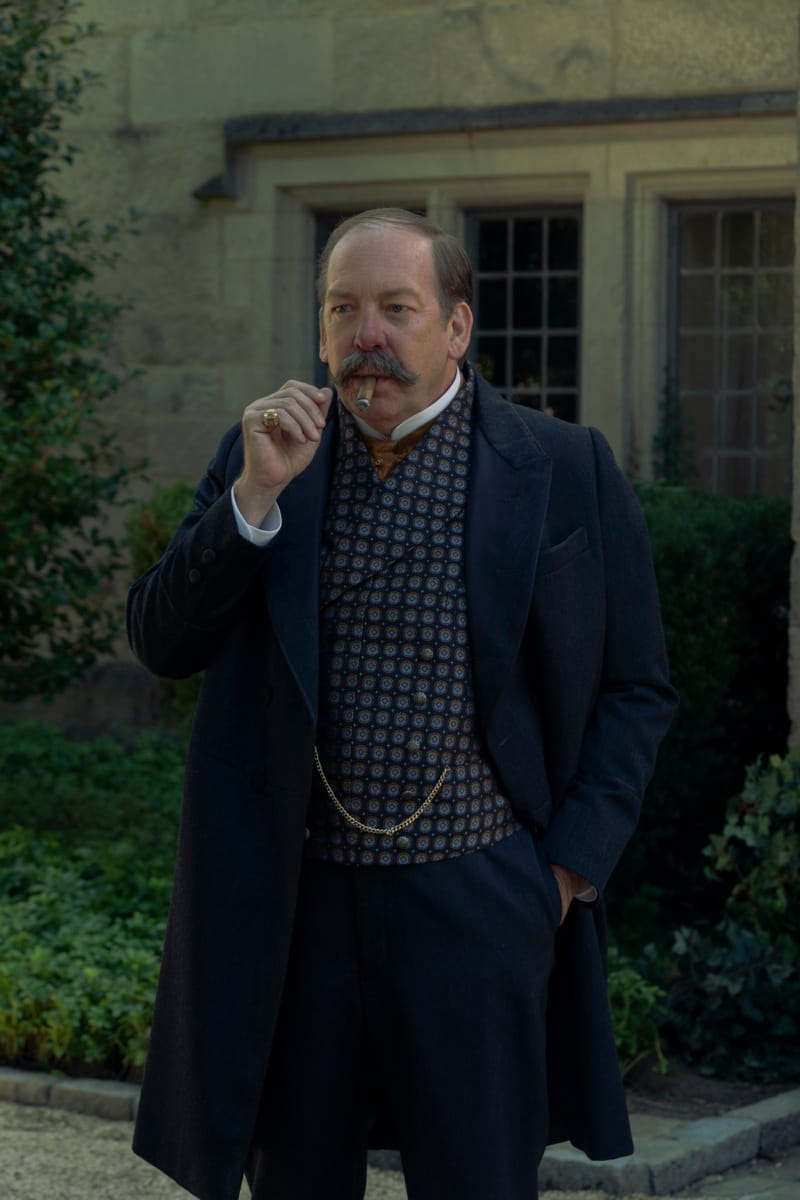
Mr. Russell travels to J.P. Morgan's country estate for some tense business negotiations. The Tudor-style stone mansion that appears on screen wouldn't have been built at the time the show takes place. It is a 1920s structure called Rynwood on Cedar Swamp Road in Old Brookville, Long Island. Sir Samuel Agar Salvage, an English businessman, was the original owner, and it is still a private residence.
J.P. Morgan Jr. had a real Long Island estate called Matinecock Point, but it was sadly demolished, like many former Gold Coast estates. It was also the site of a frightening shooting incident, which author Mary Noe details in her book, The Man Who Shot J. P. Morgan: A Life of Arsenic, Anarchy, and Intrigue, and discusses in our video archive.
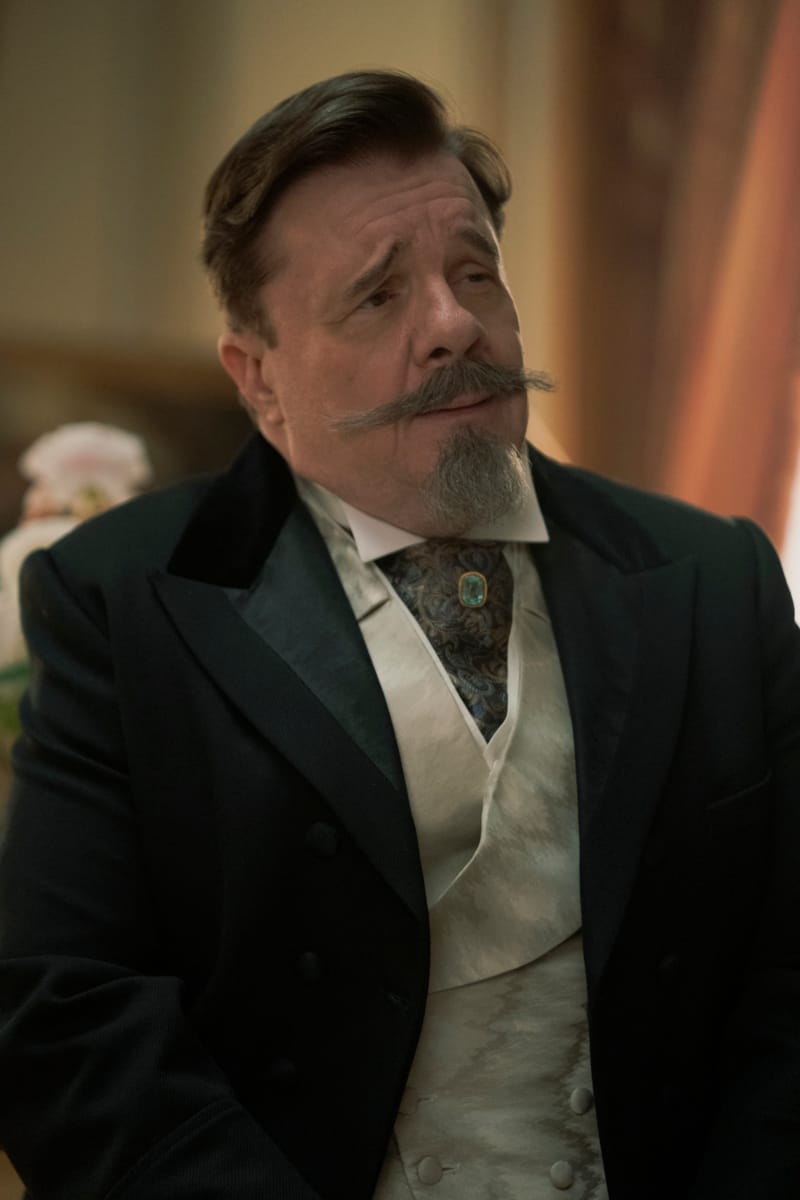
Ward McAllister causes a stir in society with the publication of his book, Society as I Have Found It. This is a tome that the real McAllister published in 1890. As in the show, this scandalous tell-all leads to his exclusion from high society. The episode opens with a montage of the book being delivered to Cassell & Co. Books, a real bookstore that was at the address noted on the crates in the show. According to the website 19th Century Juvenile Series, the shop was open at this location from 1883 to 1889.
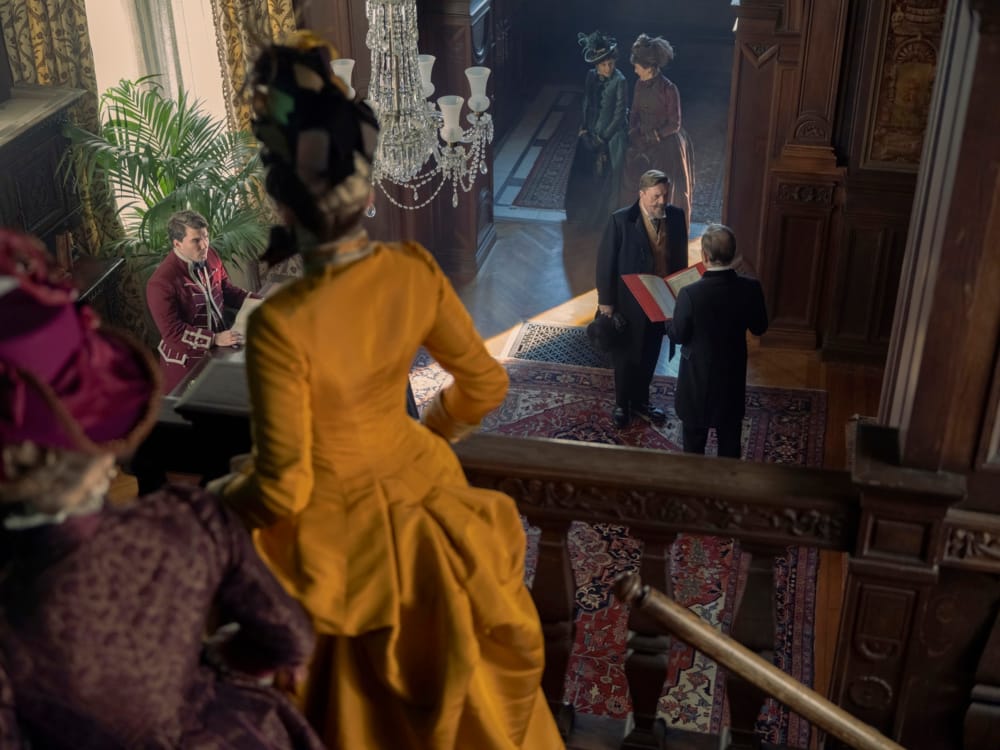
McAllister attempts to enter a party but is turned away at the entrance to what the doorman's guestlist says is The Caldwell Hotel. This scene was shot at Belcourt of Newport.
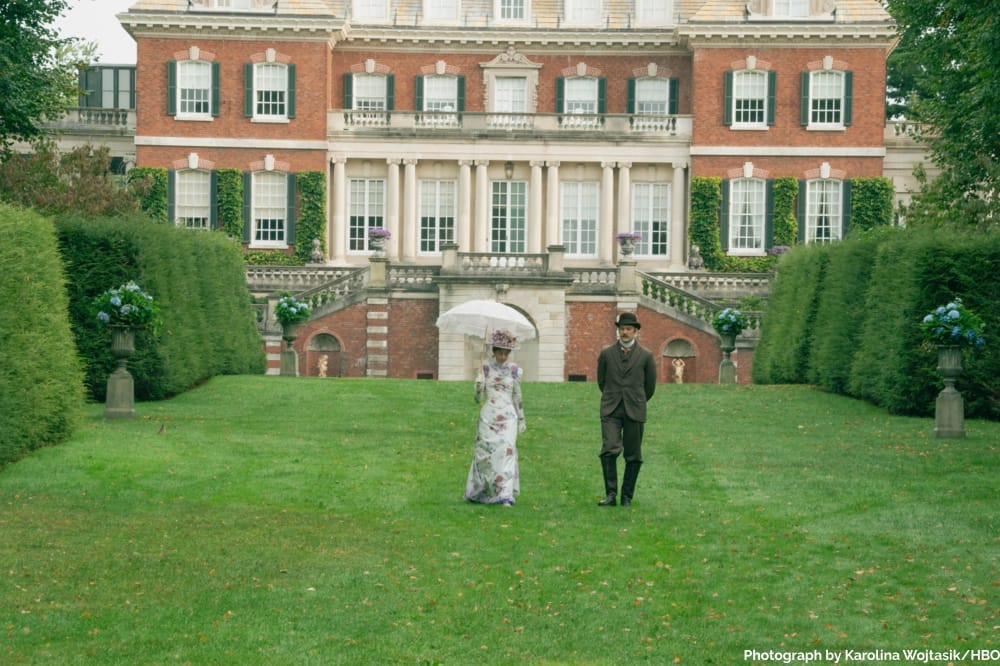
Galdys and the Duke stroll through the gardens of Sidmouth, but you'll notice the home pictured above is not what you see on screen in the show. The gardens and the house seen above are at Old Westbury Gardens on Long Island. The 1906 estate was built for John S. Phipps and his wife, Margarita Grace Phipps. In the show, the back of the home seen here is edited out with visual effects and replaced with the fictional Sidmouth mansion.
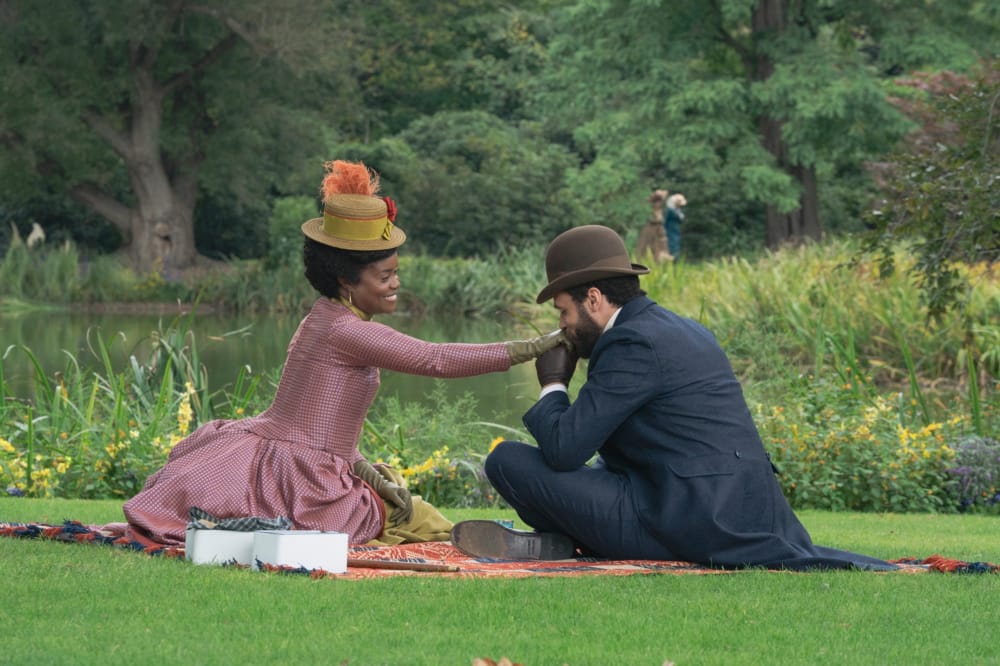
Peggy and Dr. Kirkland picnic in Prospect Park in the show, but the scene was likely shot somewhere near the other filming locations in upstate New York.
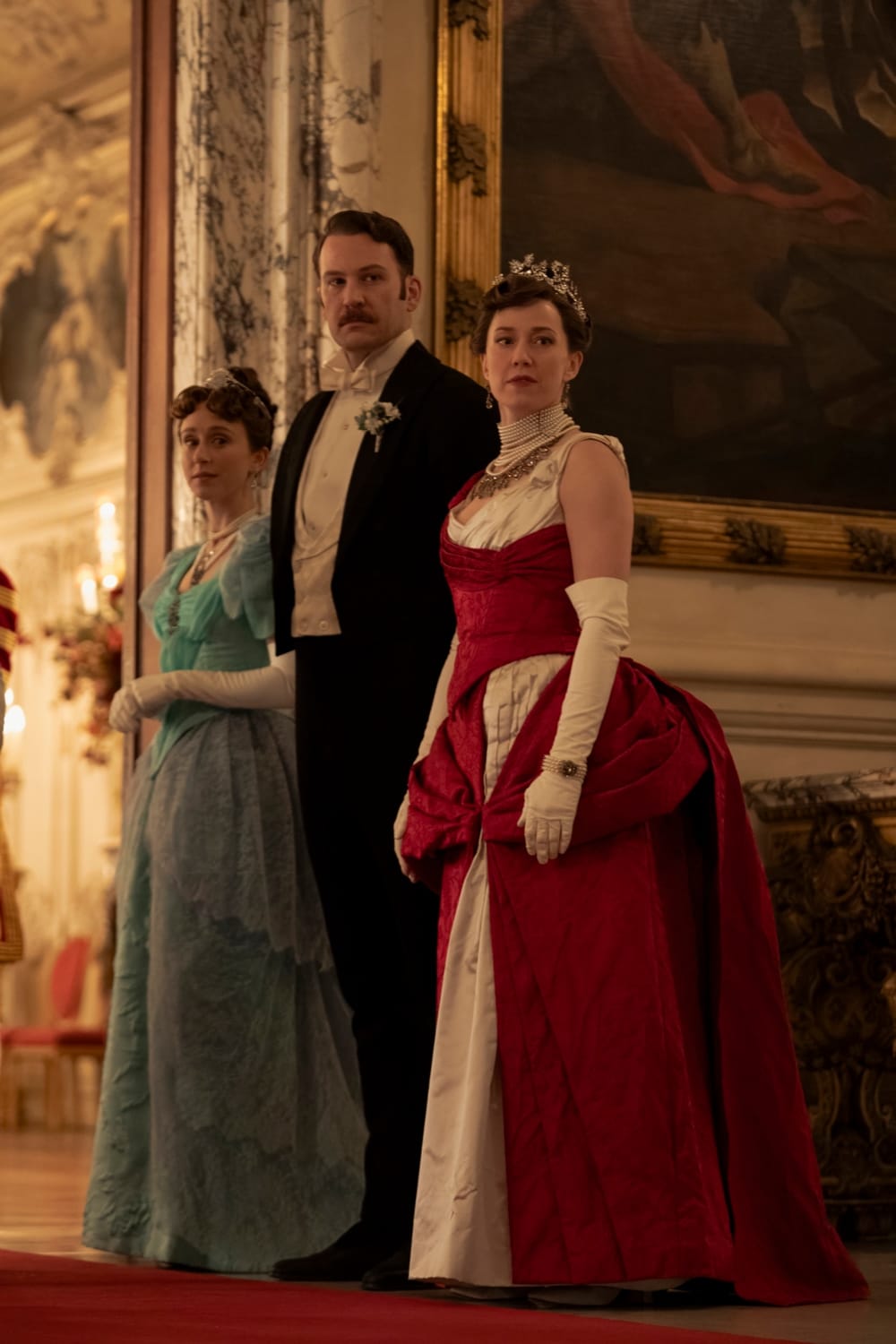
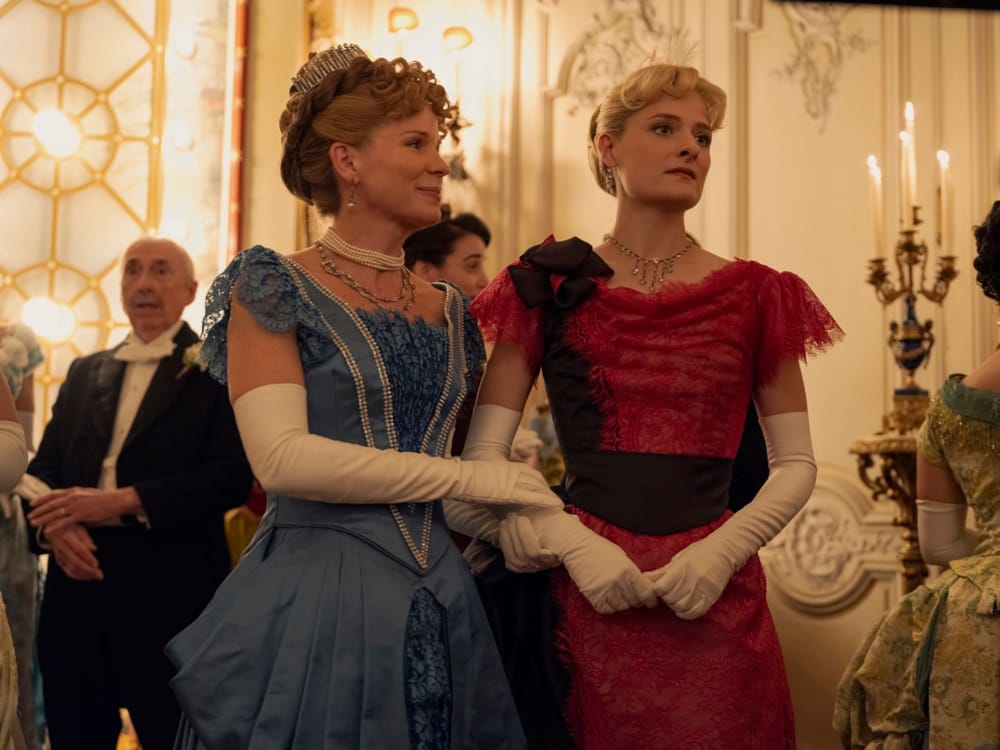
(Left) Taissa Farmiga, Ben Lamb, Carrie Coon (right) Kelli O’Hara, Louisa Jacobson, Photographs by Karolina Wojtasik/HBO
Episode 8 is a tale of two balls. Mrs. Russell takes over Mrs. Astor's typical role as host of the end-of-season ball at Newport, and the Kirklands throw a season-ending soirée as well. Mrs. Russell's ball was shot at The Elms in Newport. In one of the most striking scenes of the season, we see Mrs. Astor ascend the mansion's marble-clad staircase into the bright ballroom.
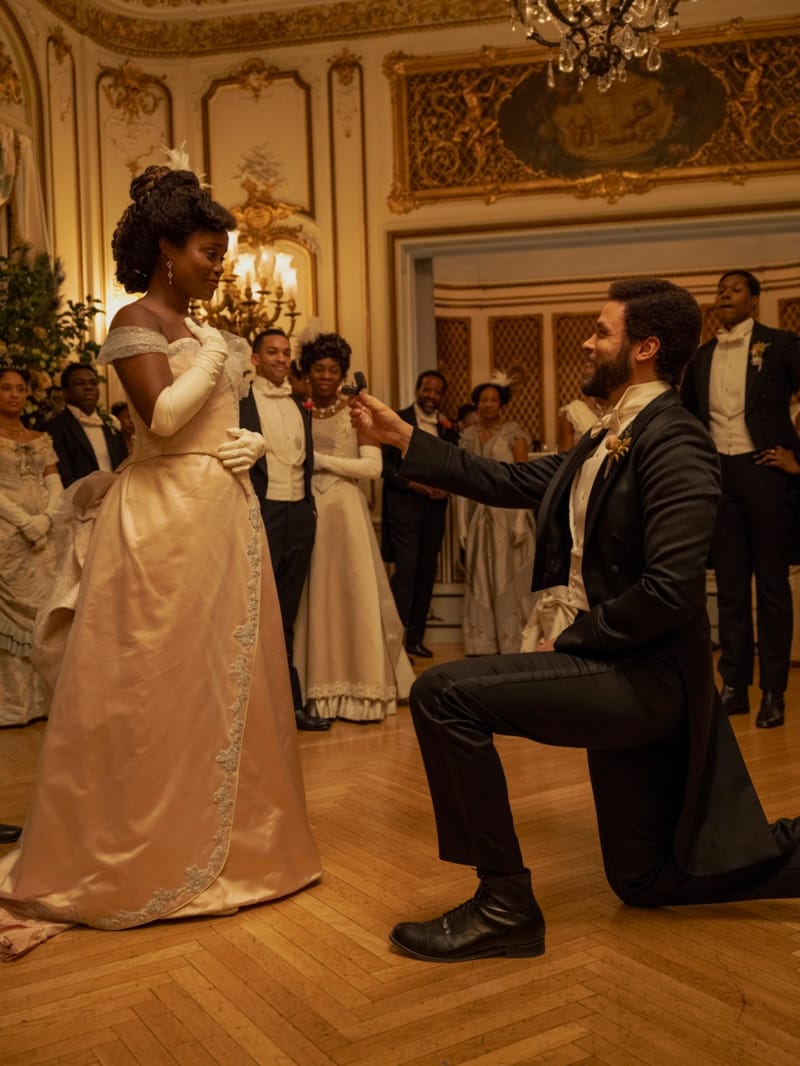
According to Vulture, the Kirkland ball was shot at Sleepy Hollow Country Club. This former Vanderbilt mansion was chosen partially for its proximity to Manhattan to accommodate Audra McDonald's schedule with rehearsals for Gypsy on Broadway. In earlier seasons, the historic building appears as Mrs. Chamberlain’s house. In the finale, it sets the scene for another romantic proposal, this time for Peggy and Dr. William Kirkland.
Now a Country Club, the mansion was originally built for Cornelius Vanderbilt's granddaughter Margaret and her husband, Colonel Elliott Fitch Shepard, founder of the New York State Bar Association. Sadly, Shepard didn't live to see the home's completion in 1893. His widow sold the property to William Rockefeller and Frank Vanderlip.
In Season 2, we meet the cast in 1883. Bertha Russell is still fighting her way to the top of the social hierarchy, while George Russell is fighting the growing strength of unions. Across the street, Marian continues to strive for independence, and her Aunt Ada surprises all with a new courtship. All of the drama unfolds beneath the oft-disapproving gaze of Aunt Agnes (Christine Baranski). Over in Brooklyn, Peggy finds her voice as an activist through her writing.

Bertha Russell stands triumphantly in her center box of the new Metropolitan Opera House at the end of Season 2. To create this grand venue, the production team blended three separate film locations. We explain in Episode 4 locations how the team used shots of the Philadelphia Academy of Music to digitally recreate the opera house. In Episode 8, we see more public areas of the opera house. Scenes on the stairs and in the lobby were shot at the Palace Theater in Albany, New York. Production designer Bob Shaw explained to AwardsDaily that the crew built five opera boxes and the corridors outside on a curved set on a soundstage in Long Island.
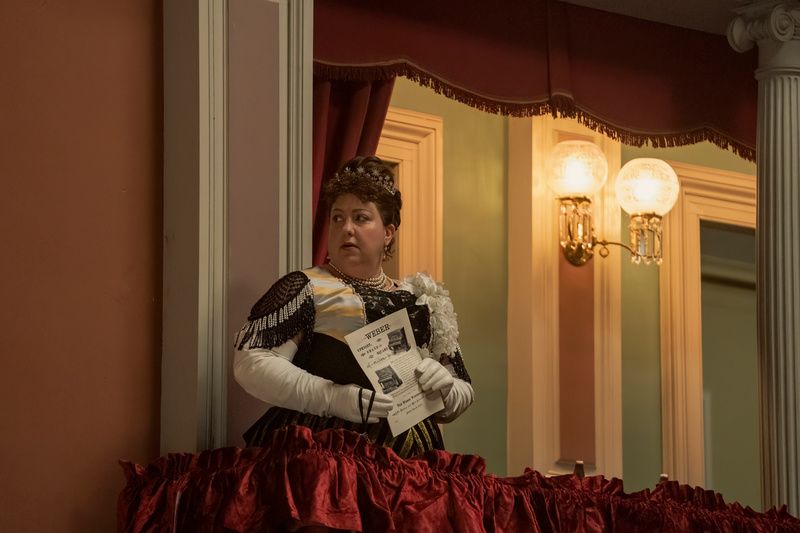
The battle of the two opera houses comes to a close in Season 2’s grand finale. In this episode, we get a look inside the new Metropolitan Opera House as well as the old New York Academy of Music. The Troy Savings Bank Music Hall is where the Academy scenes were shot. In 1870 the Troy Savings Bank planned to relocate to a larger facility. Originally founded in 1823, to demonstrate appreciation for the local community the bank included a music hall in plans for the new building. George Browne Post designed the structure, which was completed in 1875.
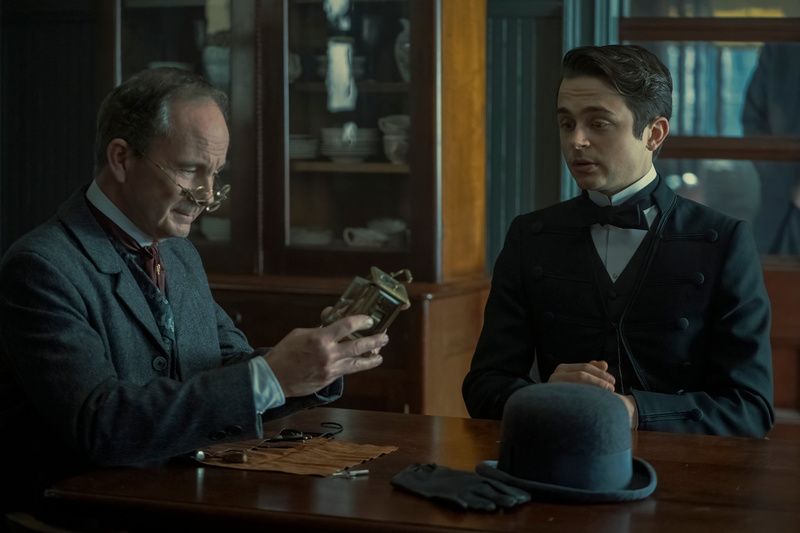
Jack, the VanRhijn’s footman, shows his alarm clock invention to a clock expert from the clockmakers’ society, called the Deutscher Uhrmacher Verein (German Watchmakers Society), in the basement of the Van Rhijn’s home. Founded by German immigrants in March 1866, we now know this organization as THe Horological Society of New York, one of the oldest watchmaking guilds in the country. Since 2015, the Horological Society has been located on the second floor of the General Society of Mechanics and Tradesmen Library, on Manahttan’s Club Row. Untapped New York Insiders recently got a tour of the library. Check out photos from that trip here!
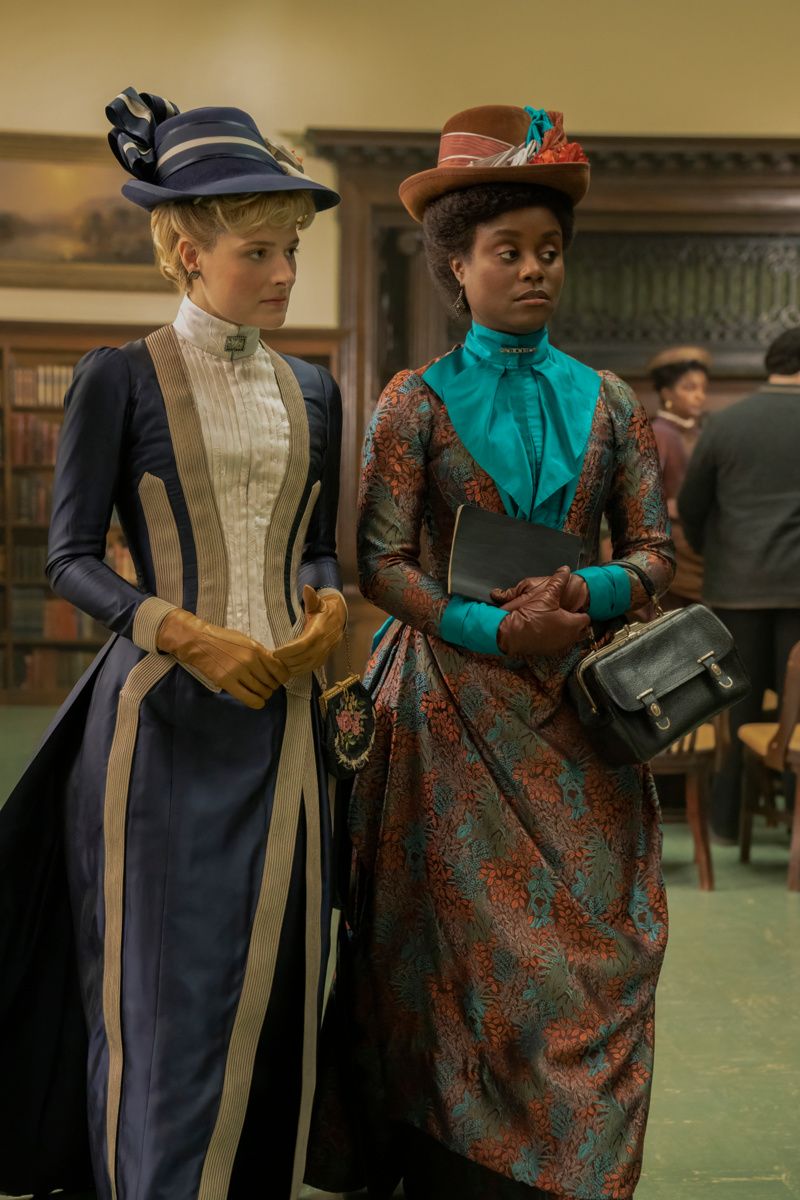
In episode 6 we learned that the Board of Education is trying to shut down schools for Black students. Peggy and her family join the campaign to fight the board and keep the schools open. In episode 7, Marion joins the ranks and gives a talk about the importance of keeping the schools open. In this episode, the meeting scenes were shot at The Troy Public Library. You can see rows of books, wooden millwork, and stunning stained glass windows. Designed by New York City architecture firm Barney and Chapman, it was completed in 1897 and now holds a spot on the National Register of Historic Places
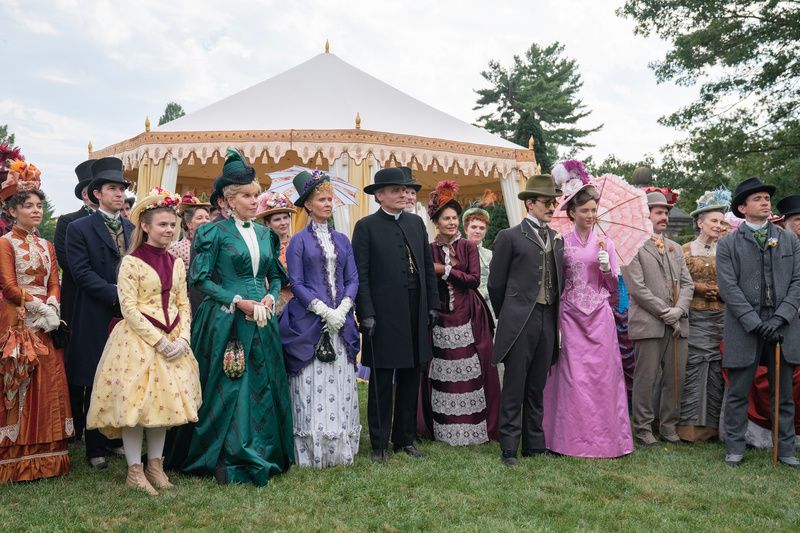
Dashell insists that Ms. Brooks attend his dedication ceremony at the New York Botanical Garden and by the end of the affair, it’s clear why. He had a very important question to ask. These scenes in the garden were filmed at Old Westbury Gardens on Long Island. The gardens are part of the Phipps estate, built in 1906. Over 200 acres are covered by formal gardens, landscaped grounds, woodlands, ponds, and lakes.
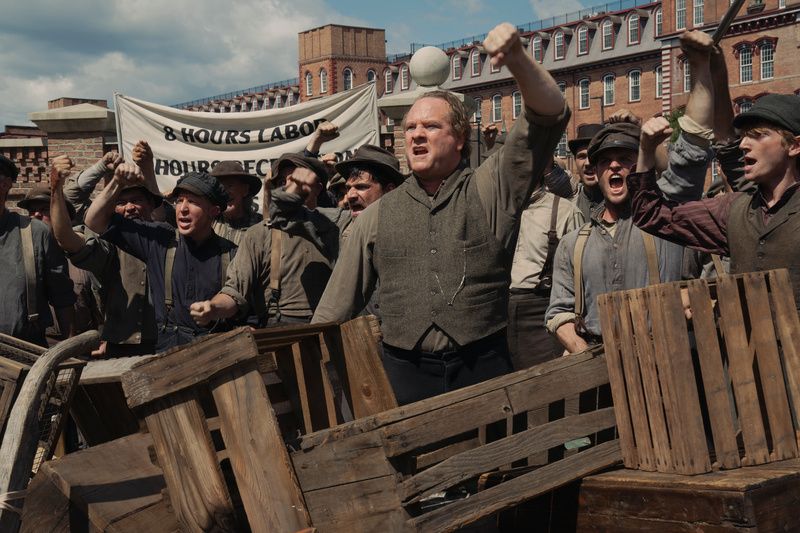
At the end of episode 6, George Russell’s fraught relationship with the union steelworkers at his Pittsburgh plant reaches a breaking point. The workers go on strike, demanding eight-hour work days. This fictional conflict was inspired by a real-life altercation. The Homestead strike occurred in 1892 and involved workers of the Carnegie Steel Company in Homestead, Pennsylvania. While Andrew Carnegie was away in Scotland, he left operations of the company to Henry Clay Frick (of the eponymous art museum). In Carngie’s absence, Frick cut wages.
The union workers were expectedly upset by this. Frick responded by firing the workers and blocking them from the plant. He hired Pinkerton Detective Agency security guards to keep the workers out. The workers knew the next step Frick would take was going to be hiring non-union workers. The workers stormed the plant and a violent battle between the workers and Pinkterons ensued, leaving at least three Pinkertons and seven workers dead. The strike in the show has a peaceful ending.
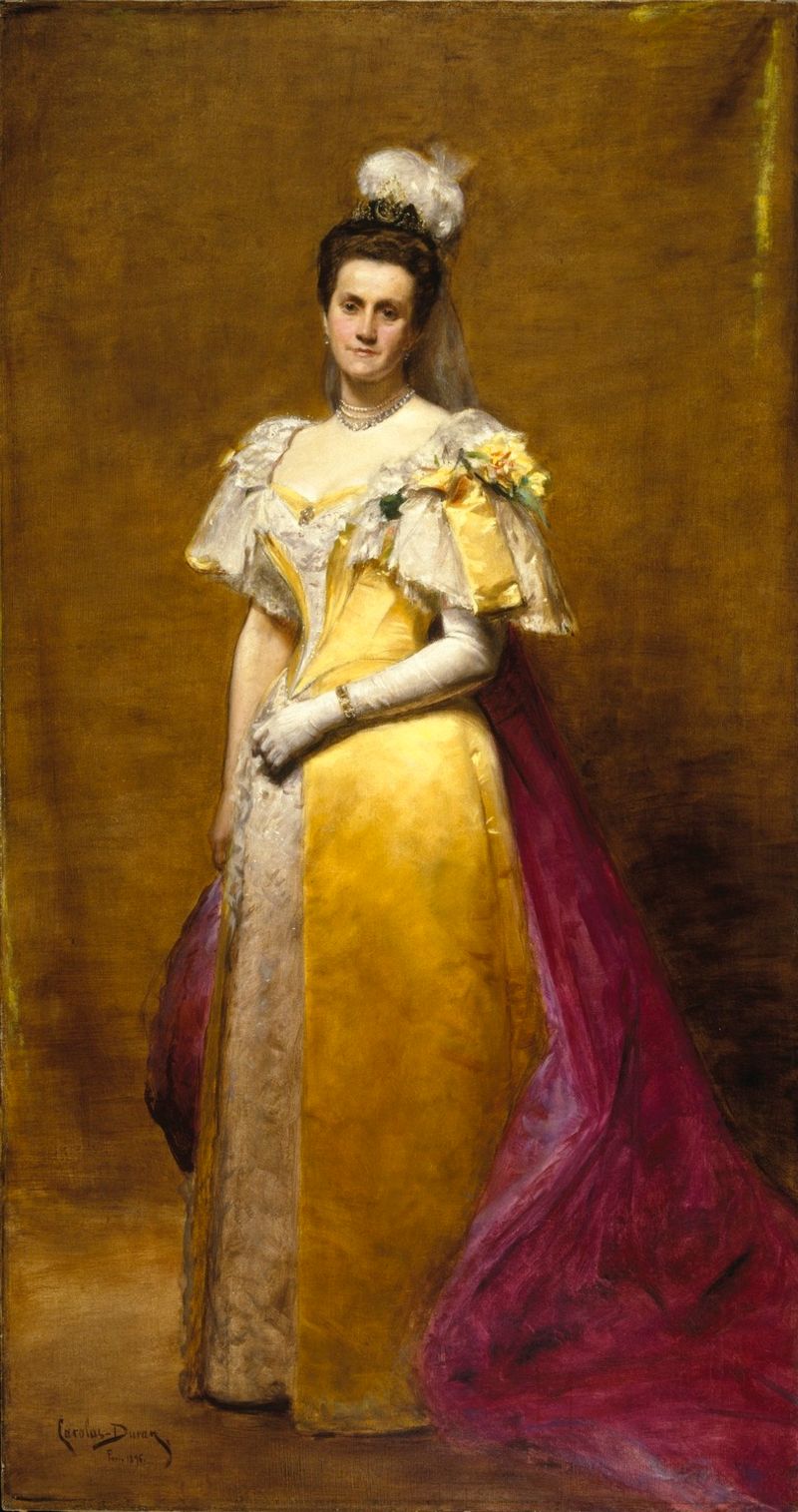
In Episode 5 Larry Russell has a meeting with a famous real-life figure in New York City history, Emily Robeling. Emily stepped up as the Chief Engineer of the Brooklyn Bridge after her husband, Washington, fell ill with caissons disease. Washington had inherited the role from his father, John Augustus Roebling, who created the original plans for the bridge. John had died from an infection after a freak accident on the construction site.
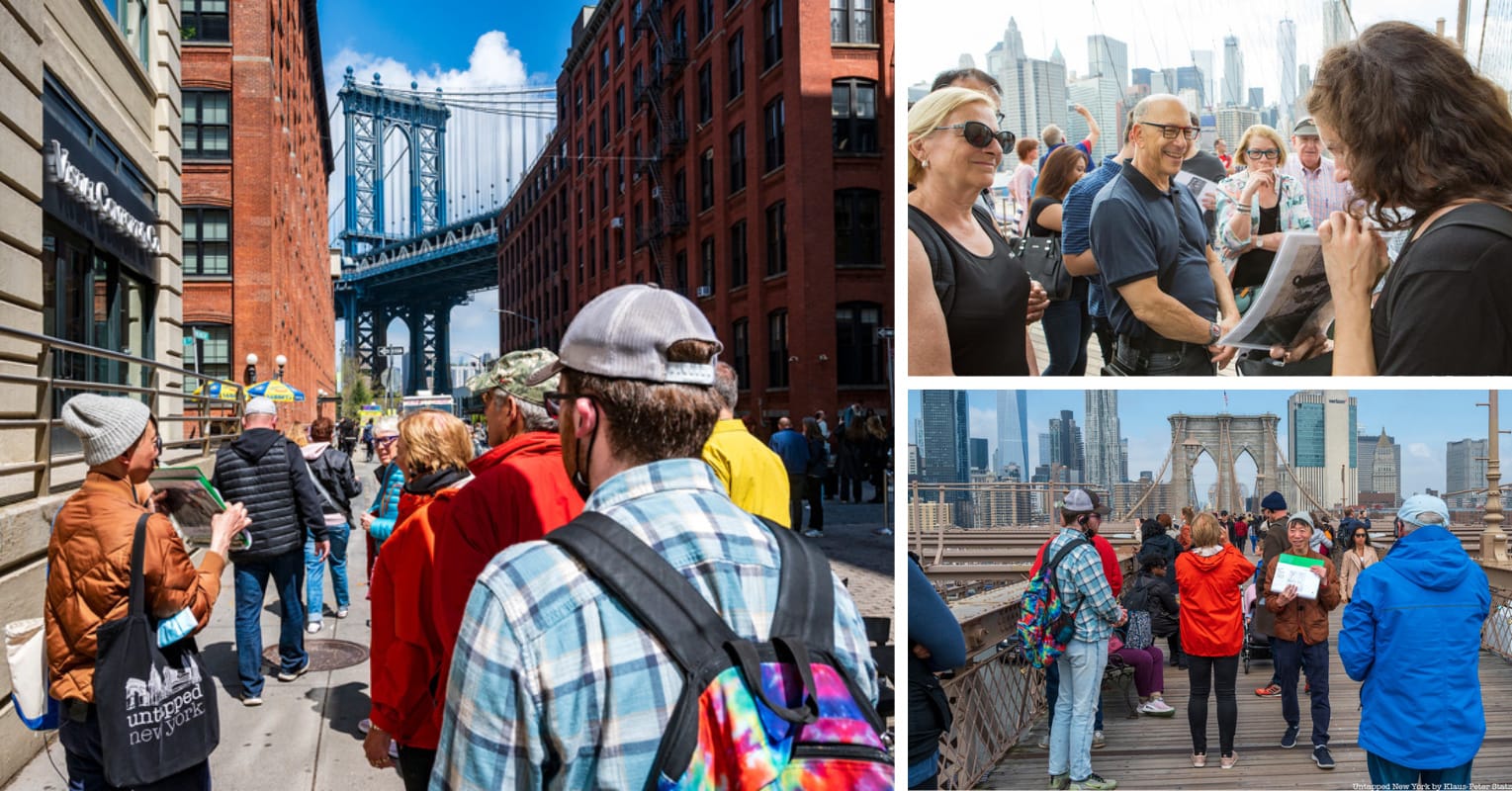
Walk NYC's iconic span and explore the formerly industrial waterfront neighborhood that is now one of the most visited (and Instragrammed) sites in all of New York!
The show creators didn’t try to find a match for the Roebling’s actual Brooklyn Heights house. Instead, they chose the exterior of a cute red house with a porch on State Street in Albany, near other locations used in the show. The porch serves as the perfect place to watch fireworks from when the bridge opens, later in the season. The interiors of Emily’s home were filmed at the Women’s Club of Albany on Madison Ave. Learn more about Emily and the Roeblings on our Secrets of the Brooklyn Bridge tour!
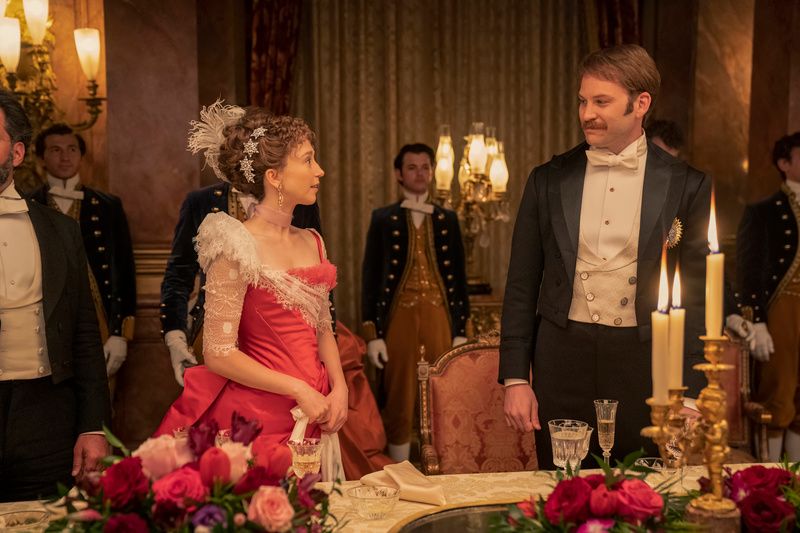
Bertha’s highly anticipated dinner in honor of the Duke of Buckingham finally arrives and goes off without a hitch, despite the schemes of Mrs. Winterton. Though most of the Russells’ Newport house scenes are shot at The Elms, this dinner scene was shot inside the rose-colored marble dining room at Marble House, the former mansion of William and Alva Vanderbilt.
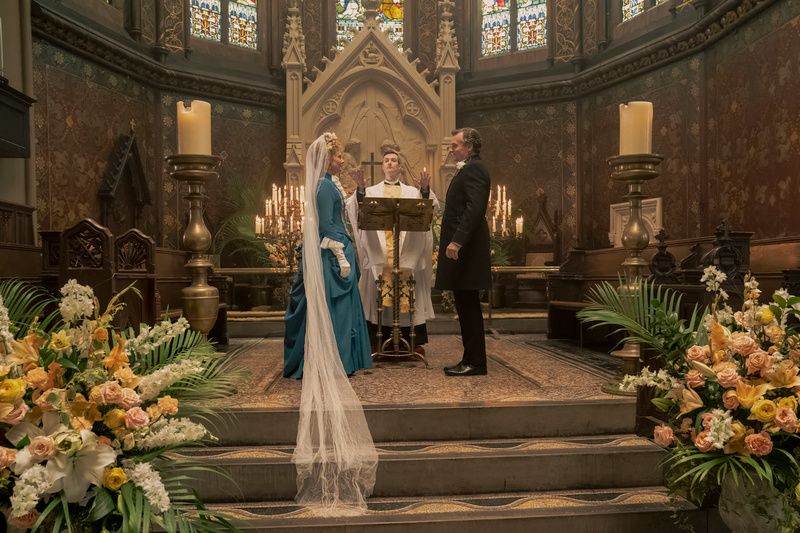
Ada finally finds love and episode 5 ends with her joyous but intimate wedding to Mr. Forte. Even Agnes, despite her disapproval, is in attendance. The wedding was filmed in the same location as the Easter service in episode 1, St. Peter’s Episcopal Church in Troy, New York.
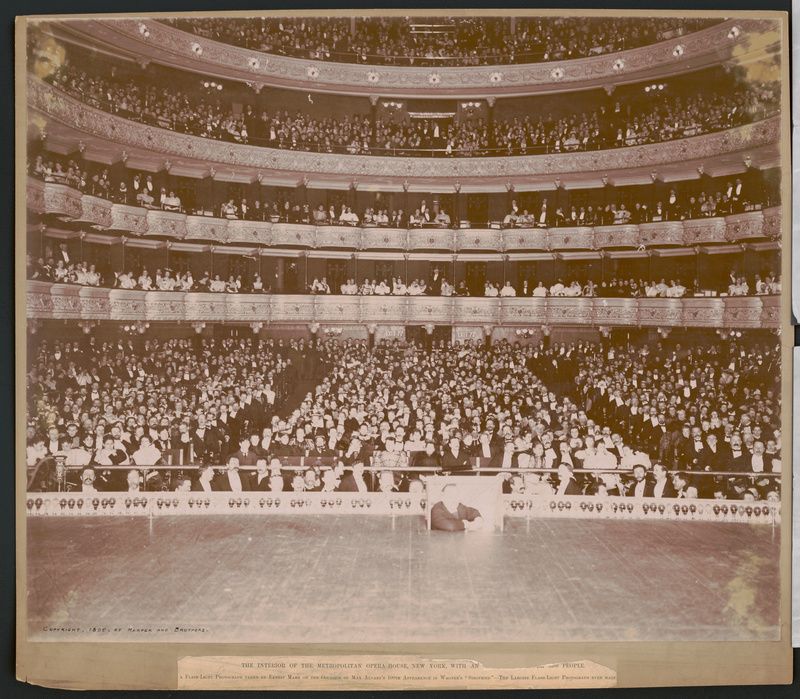
Episode 4 starts with a grand tour of the Metropolitan Opera House led by Mrs. Russell. The grand theater is still under construction but what’s been built so far is quite impressive to the patrons in attendance. As they step out onto the stage, the house lights come on over the audience, and a sea of gilded boxes is illuminated. On The Gilded Age Podcast, location manager Lauri Pitkus and VFX supervisor Douglas Purver explained how they achieved this reveal.
The very first shot in the hallway of the theater was filmed at The Palace Theatre in Albany. The stage the actors are standing on is a set while the house they look out to is a green screen image of the house of the Philadelphia Academy of Music. Pitkus explained that though there are many grand theaters in New York, there are few that are built like the original Metropolitan Opera. As opposed to movie theaters that have mezzanines, opera theaters have a horseshoe shape. The closest thing to this in New York City from around the same time, Pitkus noted, is Carnegie Hall. Rather than bring the cast to Philadelphia, the special effects team made a detailed 3D scan of the theater and shot B-roll which they then used to create what was seen in the show.
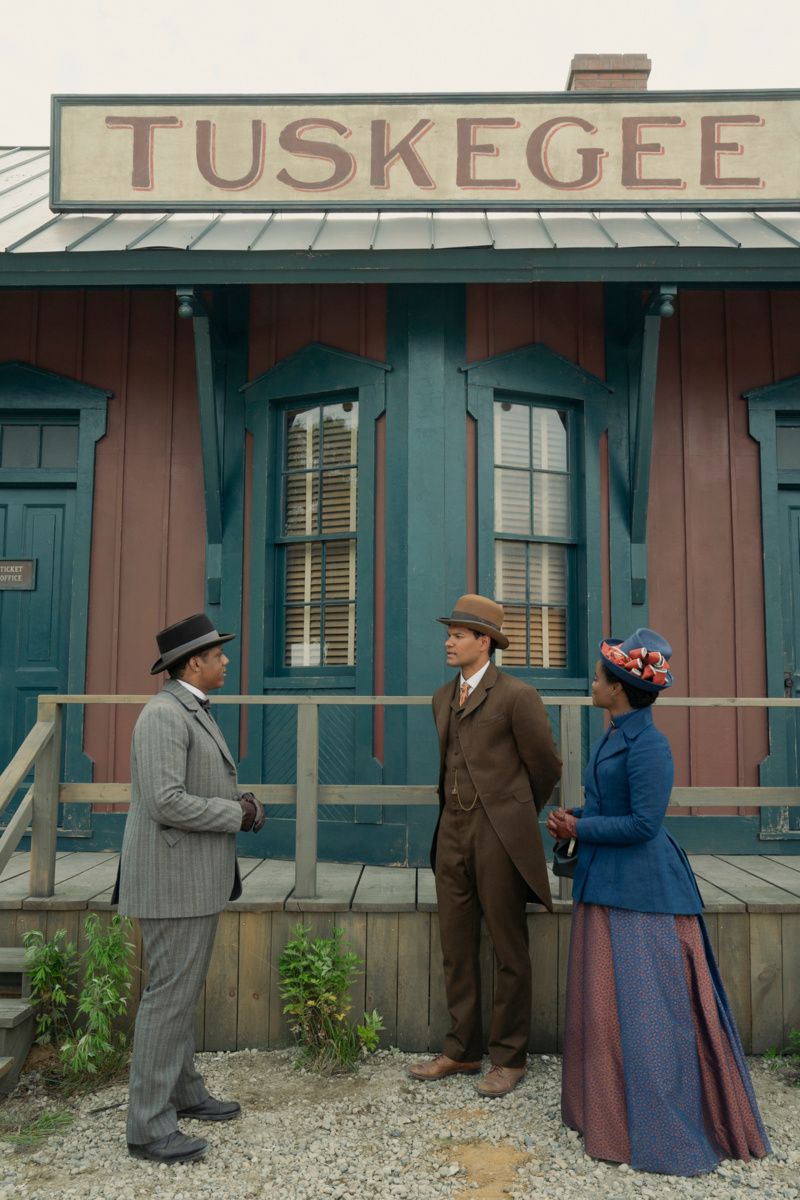
Another scene created with the help of special effects takes place at the Tuskegee train station. This scene was shot at The Gilded Age’s constructed backlot on Long Island, located on the grounds near the Museum of American Armor in Bethpage. Many of the exterior scenes are shot here on streets lined with building facades. For the train station, a station house was built along with a section of the platform. The train was computer-generated, as VFX Supervisor VFX supervisor Douglas Purver explained on The Gilded Age Podcast.
When we see Peggy and Thomas again at Booker T. Washington’s house and the Tuskegee Institute farm, those scenes were shot at Old Bethpage Village Restoration on Long Island, which neighbors The Gilded Age backlot. Executive producer and writer Sonja Warfield explained to Decider how one of the buildings in the village looked very much like Washington’s home, The Oaks. The homes at Old Bethpage Village Restoration are all authentic structures that date from the 1660s to 1875 and come from a variety of different locations from all over Long Island.
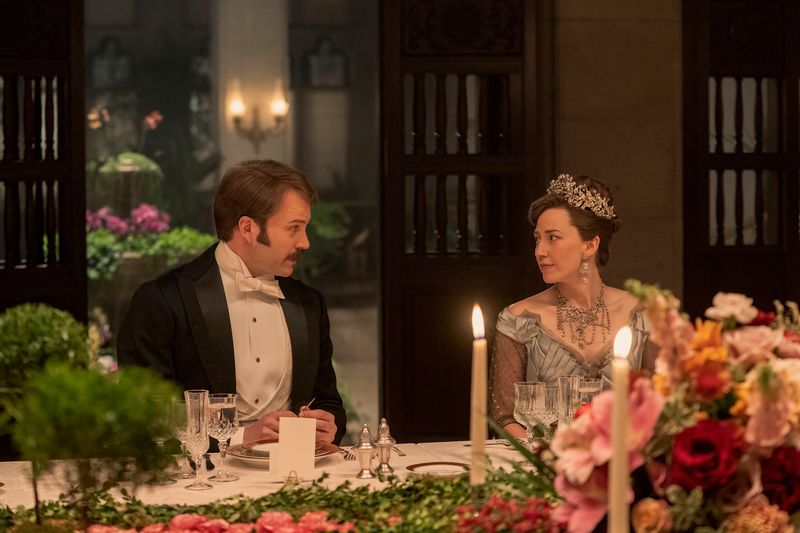
The Duke of Buckingham comes in episode 4. The first dinner scene with the Duke was shot at Hempstead House on Long Island. As location manager Lauri Pitkus explained on The Gilded Age Podcast, the crew put up panels to section-off the mansion’s large atrium and create a separate dining area. This setup allowed Mrs. Russell to sneak off and switch the place cards, ensuring that she, instead of Mrs. Winterton, was seated next to the Duke at dinner. Hempstead House is also the location of George Russell’s office.
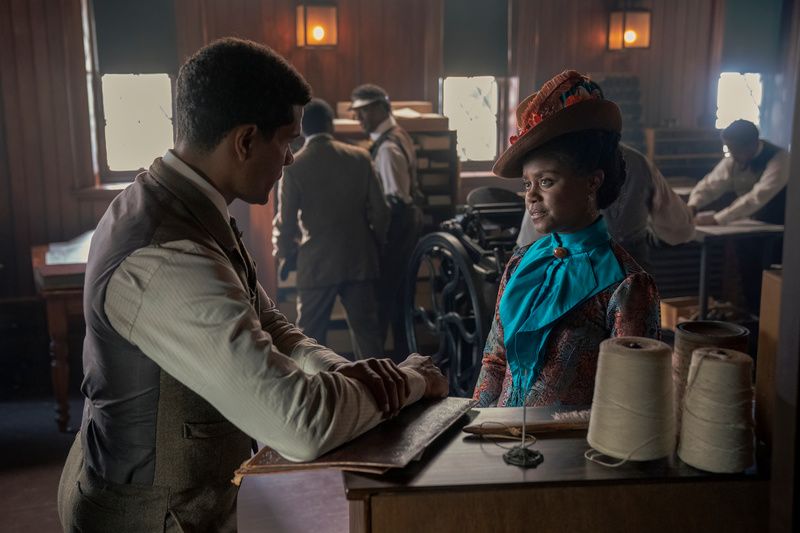
In Season 2, we see Peggy return to her job at The New York Globe. The bustling newspaper office scenes were filmed at the Carriage House of Lyndhurst Mansion in Tarrytown, New York. Many parts of the Lyndhurst estate have been used throughout both seasons 1 and 2 of the show, most frequently as Mrs. Morris’ house. A post on the Lyndhurst Facebook page noted that the newspaper office set inside the carriage house was the “most transformative and dynamic” scene they’ve had shot at the estate! The parts of the brick carriage house serve as a gift shop for the house museum, exhibit spaces, and event spaces that can be rented out.
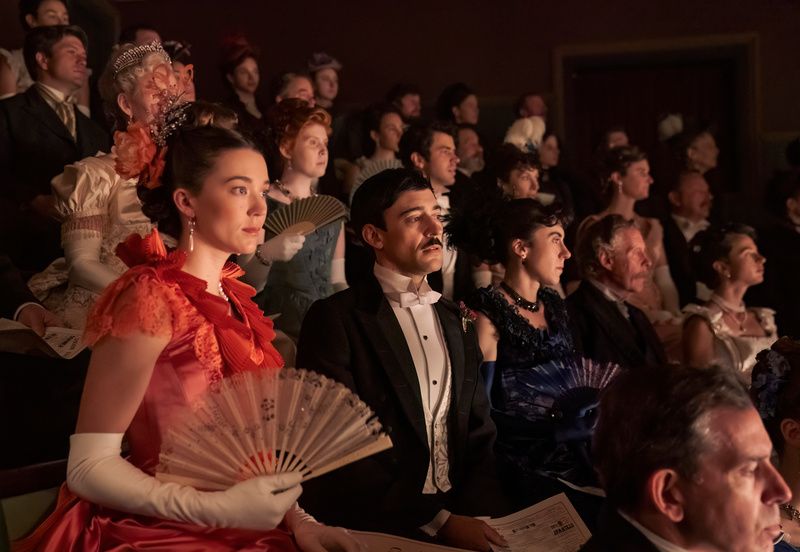
Oscar Van Rhijn, Marian Brooks, Gladys and Larry Russell, and many other characters attend the opening of a new play by Oscar Wilde in episode 3. The theater scenes in the show were shot inside Cohoes Music Hall in Cohoes, New York. The four-story hall opened in 1874 thanks to the financing of local miller William Acheson and newspaper owner James Masten. There were retail on the first floor and offices on the second floor. The top two floors were where the 475-seat music hall was located. The music hall was closed in 190 and didn’t host another performance until 1975.
Wilde visited New York on a lecture tour in 1882 and again in 1883 to oversee the first-ever stage production of one of his plays, Vera; or, The Nihilists. This play debuted in August 1883 at Union Square Theatre. When Oscar Van Rhijn tells Wilde that he enjoyed Maire Prescott’s performance, he is referring to the real-life actor who also produced Wilde’s play. As in the show, this debut was largely panned by the papers and closed less than a week after opening. This rough start however didn’t stop Wilde’s fame from skyrocketing.
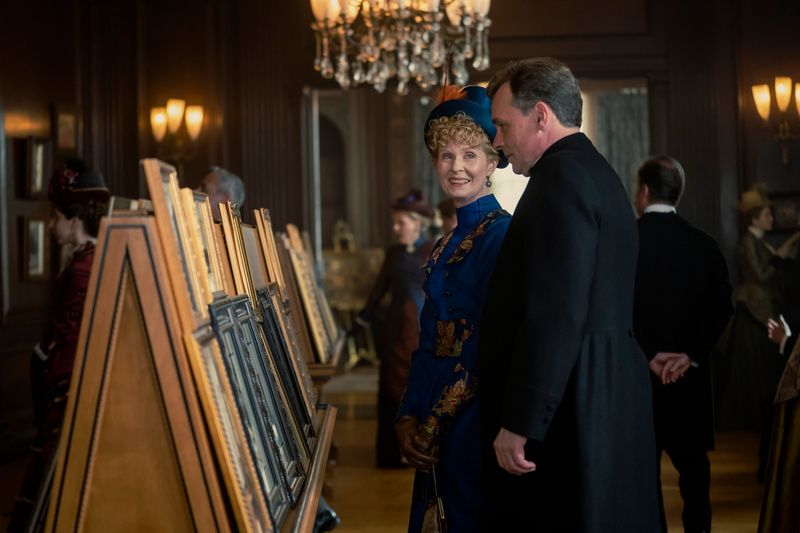
The Reverend Mr. Forte and Aunt Ada’s friendship grows in this episode. Over bowls of New England clam chowder, they both express their interest in watercolor paintings. Ada says she particularly enjoys the work of German painter Adolph Menzel. Later in the episode, Mr. Forte invites her to see an exhibition of Menzel’s work at the Ross Gallery on West 42nd Street. The scenes in the gallery were shot at Reid Castle on the Manhattanville College campus in Purchase, New York. Reid Castle appears again at the end of Episode 4 where it serves as the home of the Wintertons.
Reid Castle was the home of Elizabeth and Whitelaw Reid. Designed by Stanford White with grounds landscaped by Frederick Law Olmsted, it was completed in 1888. Reid, who served as the U.S. ambassador to France, was inspired by the architecture he saw overseas and took those influences home to build his own fortress.
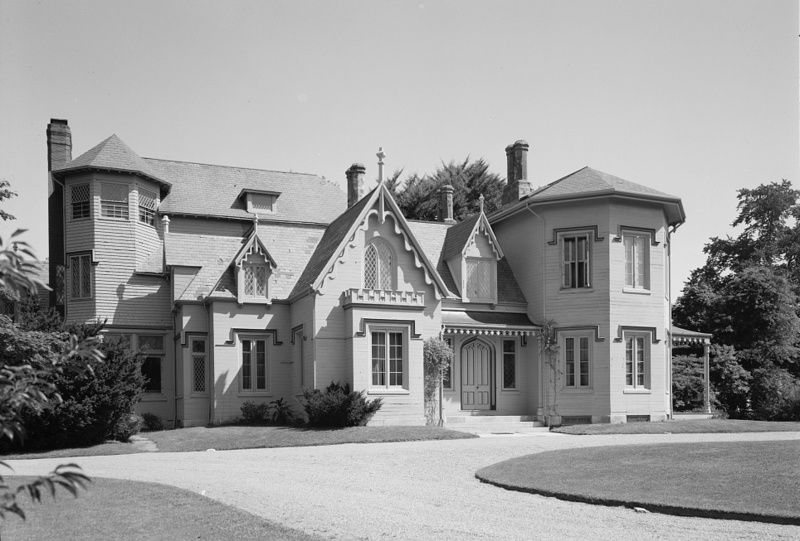
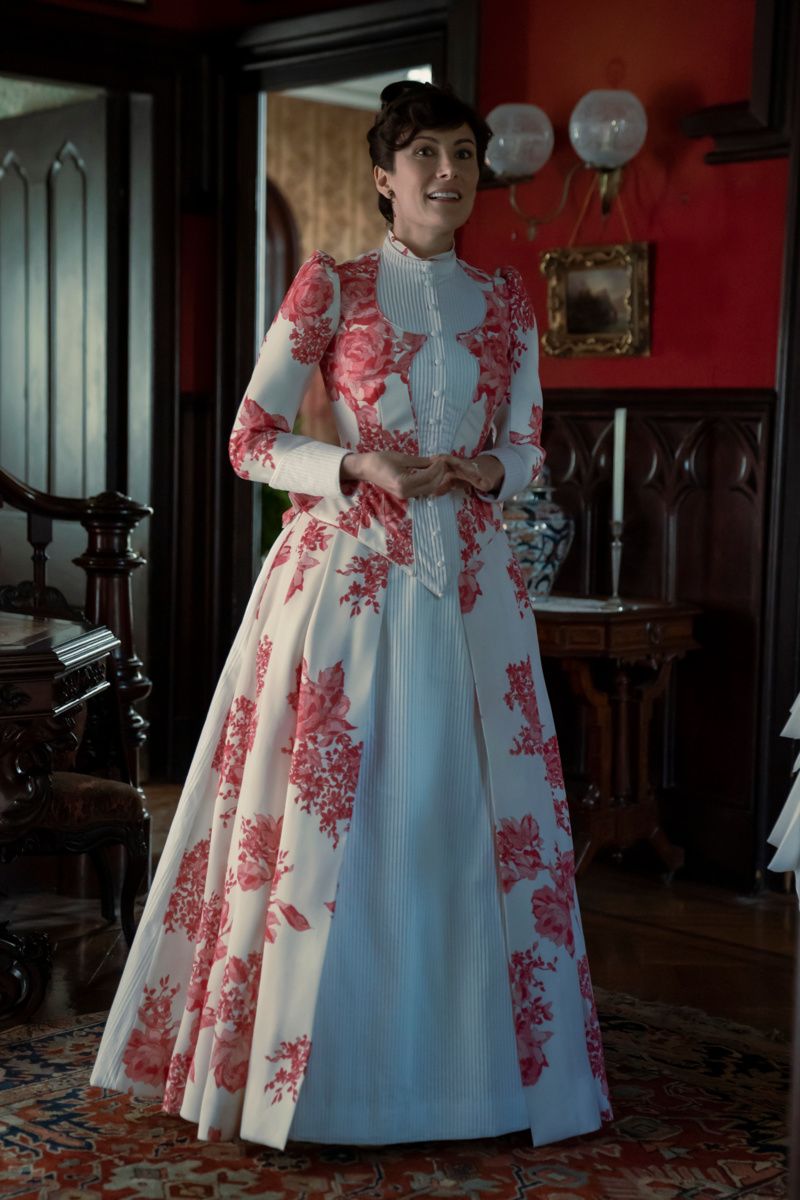
Episode 2 has characters appearing in New York City and Newport. We meet Bertha and Larry Russell, along with Mr. McCallister at Mrs. Blane’s (Laura Benanti) Newport mansion, which was mentioned in Episode 1. The real-life location is Kinsgcote, a Gothic Revival style “cottage” designed by architect Richard Upjohn in 1839. In the show, Larry, a budding architect himself, is hired to renovate Mrs. Blane’s home. By the 1880s, when this show takes place, Mrs. Blane’s quaint summer cottage, though fashionable in the early half of the century, was puny compared to the mega-mansions of families like the Russells.
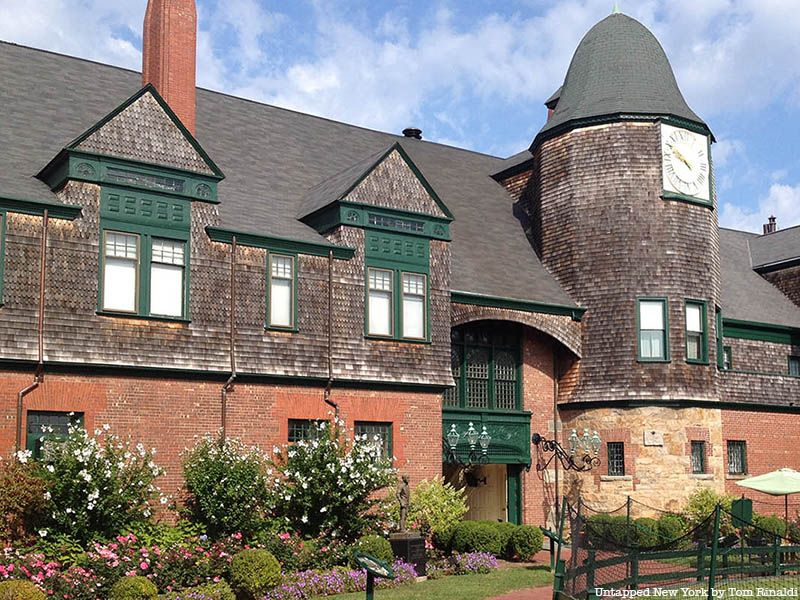
Larry brings Mrs. Blane to a tennis match at the Newport Casino to watch an old friend from Harvard. This social club, which is now the International Tennis Hall of Fame, was commissioned by New York Herald owner James Gordon Bennett Jr. From 1881 until 1914 it was home to the U.S. Open Tennis Championships. First opened on July 26, 1880, the Casino was designed by the firm of McKim, Mead, and White.
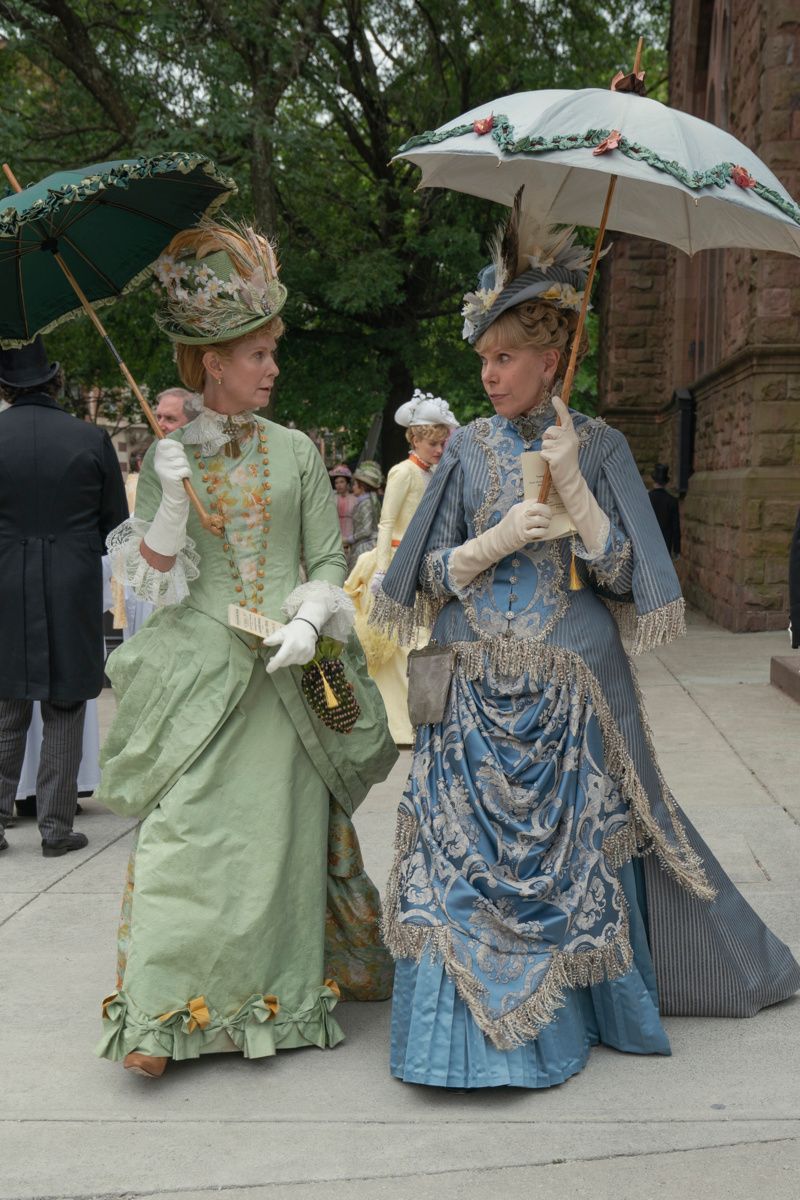
Season 2 opens with a montage of all the fanciful, feathered hats that will adorn the heads of New York City society’s most elite ladies on Easter Sunday. We are re-introduced to the cast as they don their hats and head into the street for a stroll to church. As the characters take their seats in the pews, viewers are reminded of the hierarchal structure of their world. Three different churches are featured in this first episode, one for the house staff, one for the wealthy high society families, and one for Black worshippers.
The Van Rhijns and Russells, who represent the upper crust, attend mass at the newly opened St. Thomas Episcopal Church at 53rd Street and Fifth Avenue in the show. In reality, the church scenes were shot at two separate locations in Albany, New York. Exterior shots were filmed at First Presbyterian Church which sits at the corner of Willett and State streets across from Washington Park. The park and surrounding streets are seen as the characters make their way to the church. Once inside, all of those shots were filmed at St. Peter’s Episcopal Church, just a few blocks away on State Street.
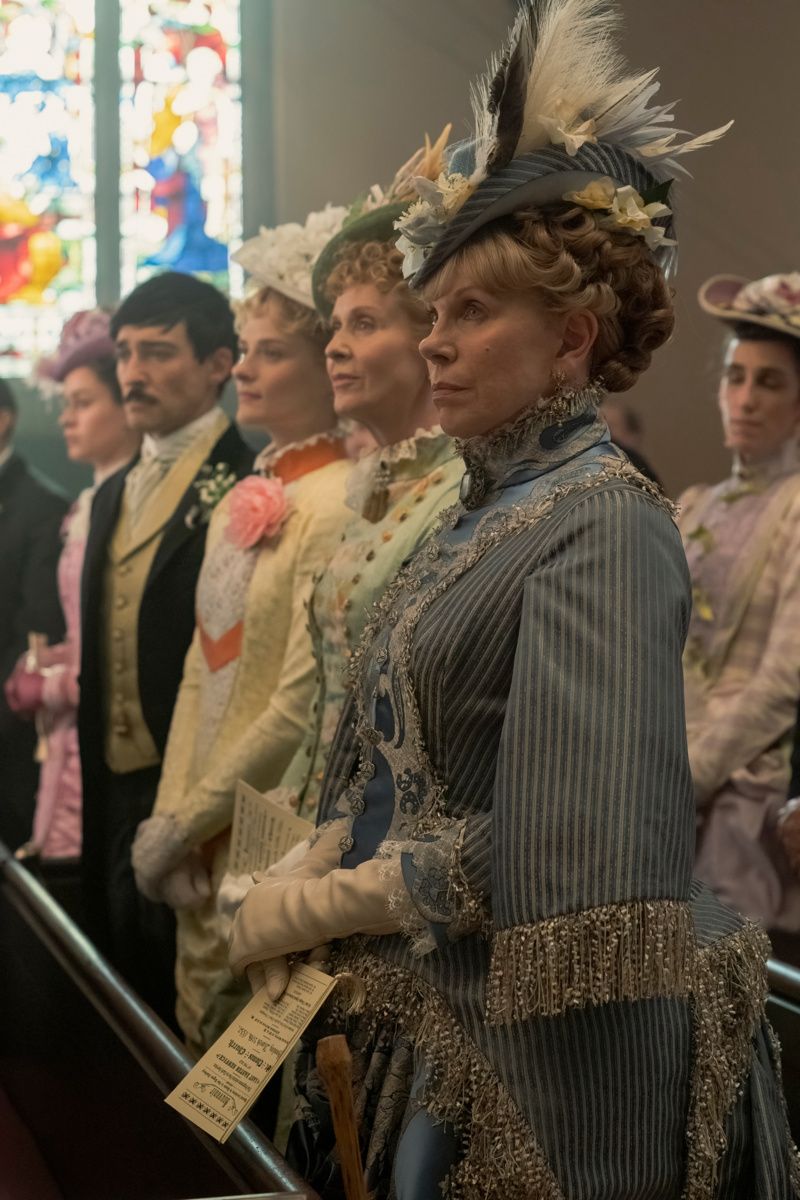
St. Thomas, the church these Albany locations represent, does still exist, however not as the same structure that stood in the 19th century. Originally founded in downtown Manhattan in 1823, the congregation of St. Thomas moved to the Upper East Side in the latter half of the 1800s. The first service in the 53rd Street church was held in 1870. Sadly, that church burned down in 1905. The grand building that stands in its place today was completed in 1913.
When we meet up with Peggy (Denée Benton) in season 2, she is attending Easter Mass with her parents in Philadelphia. The interior scenes in that sequence were filmed at First United Presbyterian at 1915 Fifth Ave in Troy, New York, a church built in 1865.
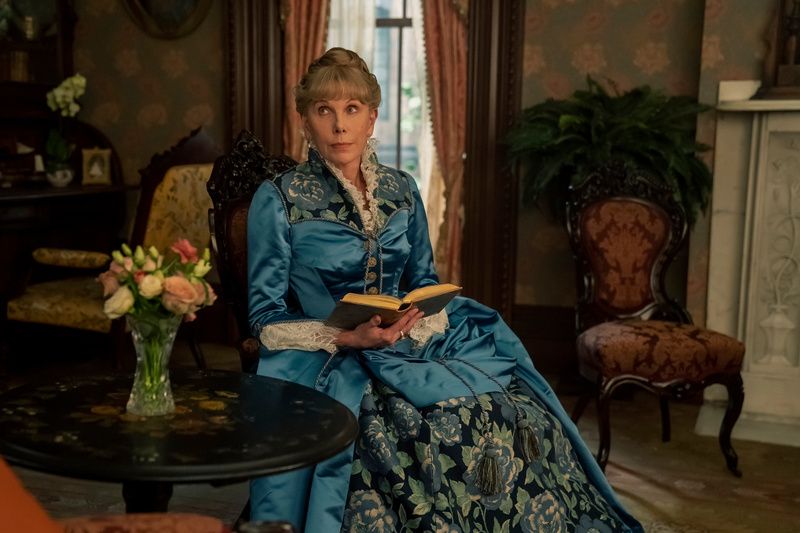
The Van Rhijn townhouse featured prominently in Season 1 and it gets a lot of screen time in Season 2’s premiere. As a representation of New York City’s old money, the Van Rhijn home forms a distinct contrast to the Neoclassical exterior and Rococo interior of the Russells’ mansion. The Van Rhijns prefer the architectural style of the old set, a classic townhouse layout with wood-based interiors that are not too flashy.
While some interiors of the old money set were filmed in real-life locations, the interior of the Van Rhijn townhouse is a set. Crockett says, “We treated the entire season like a giant movie. We crossboarded the entire season and shot all of the scenes for each house at one time. We built a backlot with giant sets. We had four different soundstages in two different locations.”
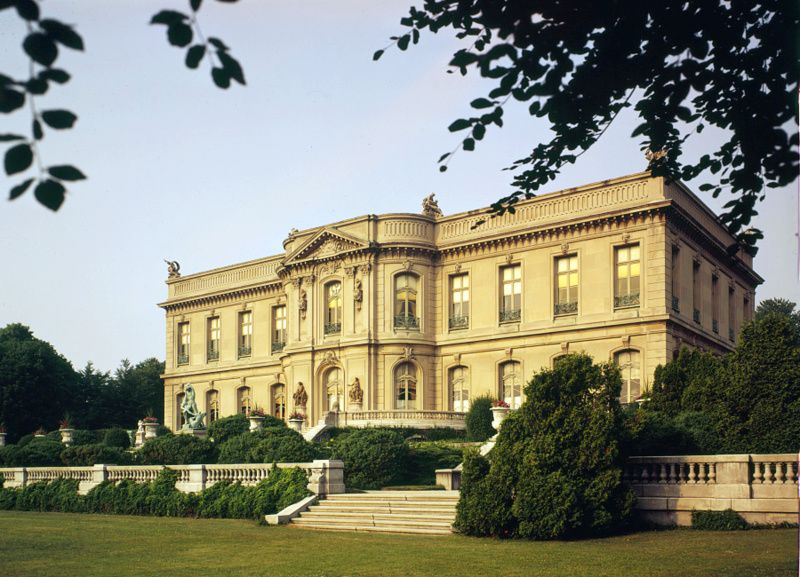
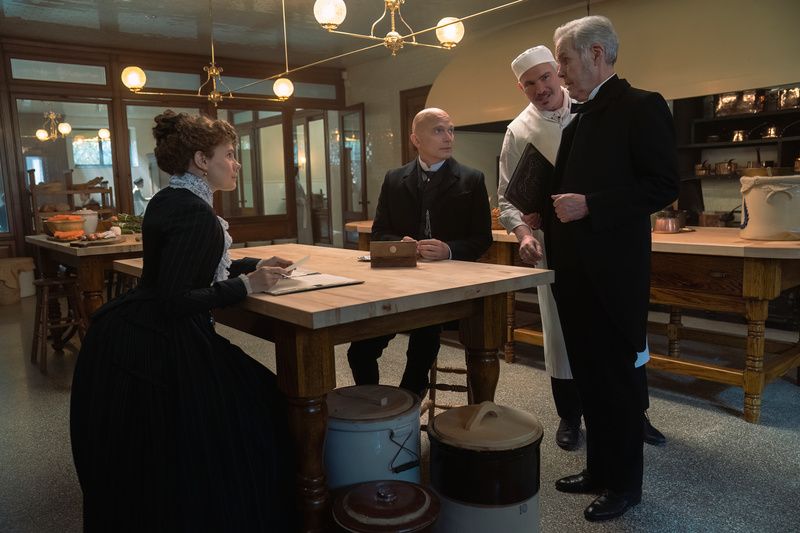
On a trip to Newport, Rhode Island to check on the state of her new mansion, Bertha Russell (Carrie Coon) introduces the central drama of this season as she walks the expansive grounds with Ward McCallister (Nathan Lane). Bertha wants a box at the opera. As in the first season, she wrestles with trying to win approval from the old money figures like Mrs. Astor (who is seemingly keeping her out of the Academy of Music), or to strike out on new territory and blaze her own trail (support the new Metropolitan Opera).
The lavish Newport estate scenes were shot at The Elms, a 1901 mansion modeled after an 18th-century French chateau. It was designed by Horace Trumbauer, an architect who also designed Lynnewood Hall near Philadelphia, one of the largest Gilded Age mansions still standing. Both the exterior and interiors of The Elms are shown on screen. The viewer is treated to scenes of the marble-clad entryway, the gilded ballroom, the library, and the sprawling downstairs kitchen area.
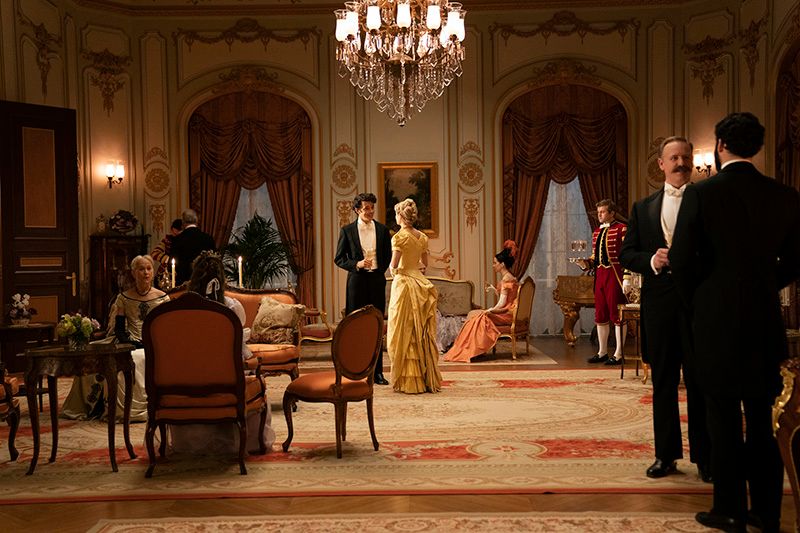
George and Bertha Russell, played by Morgan Spector and Carrie Coon, are the quintessential “New Money” New Yorkers. George, a ruthless businessman, has made a fortune in railroads and Mrs. Russell seeks to be accepted into New York society. In Season 1, they had just built an enormous mansion on 61st Street designed by the real-life architect Stanford White. It’s just across the street from the old money Van Rhijns as well as the entrance to Central Park. In the first episode of Season 1, White says to Mrs. Russell, “I’m pleased with the size. It’s big enough to be splendid but not oppressive.” Mrs. Russell, responds “I agree. One needs to be able to breathe.” The clock in the lobby, White says, comes from the Hotel de Soubise, one of the hôtel de partculiers, in Paris’ Marais district.
In Season 2, the Russells are settled into their new home, while still not perfectly settled into New York City society. Some of the interiors of the Russells’ mansion (such as the ballroom and the billiard room) were filmed in the grand rooms in The Breakers, the Vanderbilt mansion in Newport, Rhode Island. The entrance hall and sitting room of the mansion in The Gilded Age are so impressive you might be wondering which mansion it was filmed in, but it is actually a set built on the soundstage at the Museum of American Armor in Bethpage, Long Island (near the filming locations for Dickinson). Other interiors were created on soundstages at Broadway Stages in Greenpoint, Brooklyn.
The street itself was built in a backlot at the Museum of American Armor. The street sets look too pristine to be New York City (in our opinion)! They have a bit of a Disneyland feel in their perfection, something that the sets of Bridgerton also had. In real life, the northeast corner of 61st Street and Fifth Avenue is now an apartment building, across the street from the Pierre Hotel. On the same site previously was a large mansion designed by Richard Morris Hunt for lawyer Elbridge T. Gerry, which included a library for his 30,000 books. Keep reading to discover filming locations from Season 1, and stay tuned for more spectacular Season 2 locations as more episodes air!
The props were almost as big a feat as securing filming locations in The Gilded Age. Prop master Michael Jortner says, “We worked closely with Julian on certain things, such as composing articles for newspapers and deciding what table settings would be laid out. We went over all the scenes of food preparation with the directors to make sure they had the required level of food to keep everybody moving.”
Meanwhile, one important prop came across the country for Season 1, says Jortner: “The printing press in one scene came from a museum in California and we reassembled it on location to get it running. They also had a team to create the props needed: “We acquired a lot, but we also built from scratch. Some items we bought were in disrepair, so we used them as a reference point. The parasols and umbrellas were original, but we had to redo the canopies. All the copper cookware was re-coppered to make it look brand-new. We made all the police badges. Then we were repairing things as we went.”
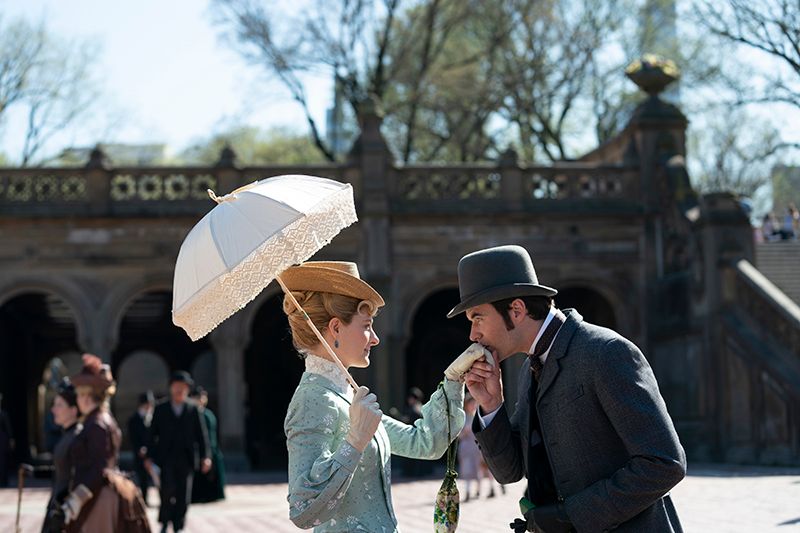
Central Park was built over the course of two decades, from 1857 to 1876. The Gilded Age has its characters taking walks, riding carriages and meeting people in the park. One of those meeting locations, Bethesda Fountain, was a real-life filming location. It was shot on a sunny afternoon, with hundreds of period costumed extras filling the large terrace. The main action took place around the fountain.
Bethesda Terrace was designed by Calvert Vaux, one of the two main architects for Central Park, while the sculptures of the terrace and the fountain were designed by the mostly-forgotten architect Jacob Wrey Mould.
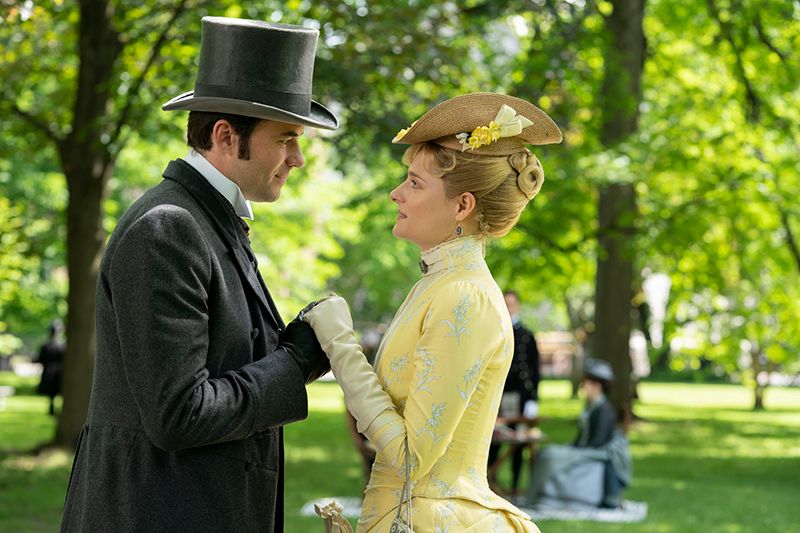
From 1876 to 1882, the arm and torch of the future Statue of Liberty was on display in Madison Square Park, as a fundraising effort for the pedestal of the statue. This location becomes a meeting spot for two characters in The Gilded Age. The filming location for this scene in The Gilded Age is not inside the real Madison Square Park, but at Washington Park in Troy, New York.
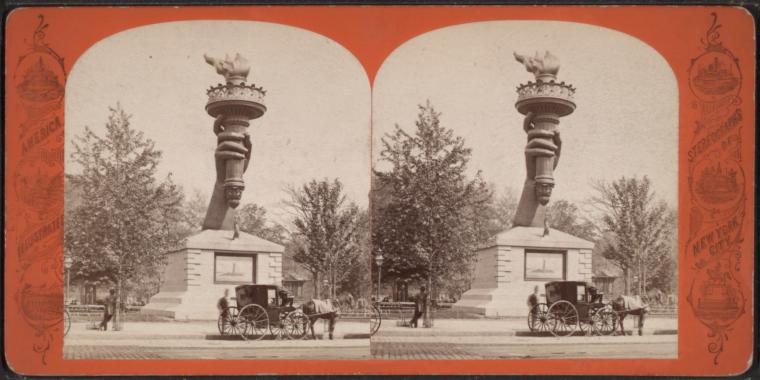
Before Madison Square Park, the torch was actually in Philadelphia for the World’s Fair (also known as the Centennial Exposition) in Fairmount Park from May 10 to November 10, 1876. For a $0.50 entry fee, fairgoers could climb to the balcony and the proceeds went to the funding of the statue. Bartholdi himself also came for the event. You can see Untapped New York founder Michelle Young speaking about the construction of the Statue of Liberty in the History Channel series The Engineering That Built the World.
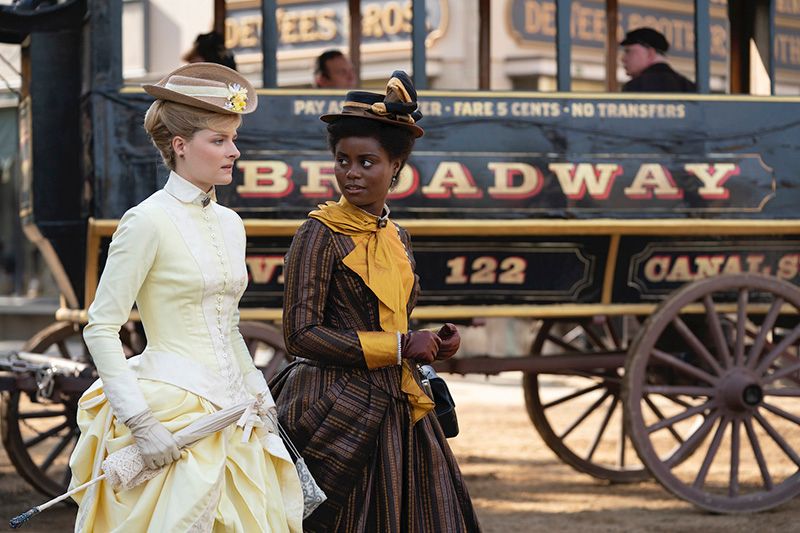
The production team went looking for a streetscape that would resemble 1880s New York City. They found some of that in Troy, New York, a city outside of Albany. Crockett says, “Troy was a godsend. I had been there years earlier for The Age of Innocence. Troy was prosperous through the Civil War, but when the railroad came in and the canal was no longer the preferred method of transporting goods, it receded. But the buildings from the 1830s, ‘40s and ’50s are still there. We basically transformed a full city square and had five blocks fully dressed with horses, carriages and extras. It was pretty special.”
Troy, New York also served as the backdrop for scenes that take place in Brooklyn, involving a Black character named Peggy Ryan (played by Denée Benton) whom Marian befriends, as well as plot lines that take place outside of New York City, like a trip to see the opening of a Red Cross Hospital.
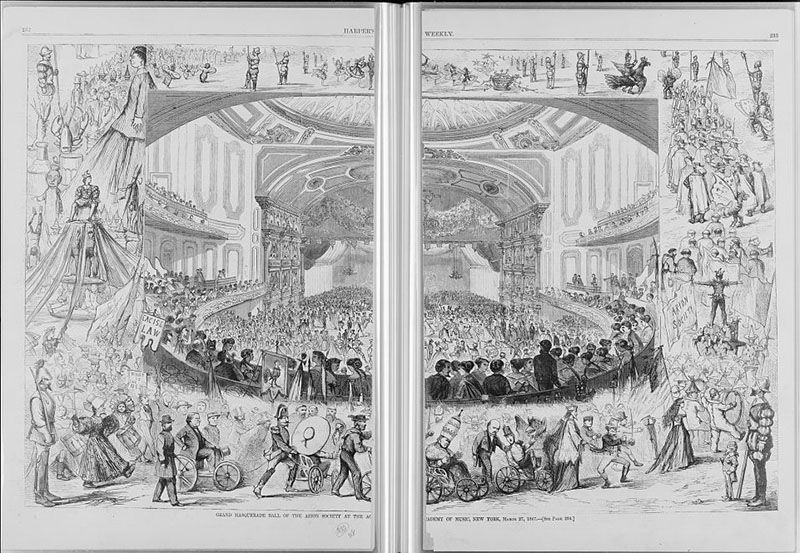
Uptown and downtown is another big theme in The Gilded Age. The Russells move from downtown, where it is no longer fashionable, uptown to 61st Street. Historically, this is where old and new money are building homes along Central Park. The same goes for the entertainment scene. Downtown becomes not only out of fashion but a bit seedy. The opera house for the old New York money set is downtown, on Irving Place and 14th Street. None of the new money set can get boxes there, so they eventually decide to build a new opera house.
For the filming of the Academy of Music, the production team of The Gilded Age made use of Troy once again. The Troy Savings Bank Music Hall was designed by George B. Post (who once had many buildings in New York City, most of which have been demolished) and built between 1871 and 1875. It is a unique mixed-use building, designed from the start with banking halls on the bottom floors and the music hall on the upper floors. The building was designated a National Historic Landmark in 1989 and the music hall is run by a non-profit.
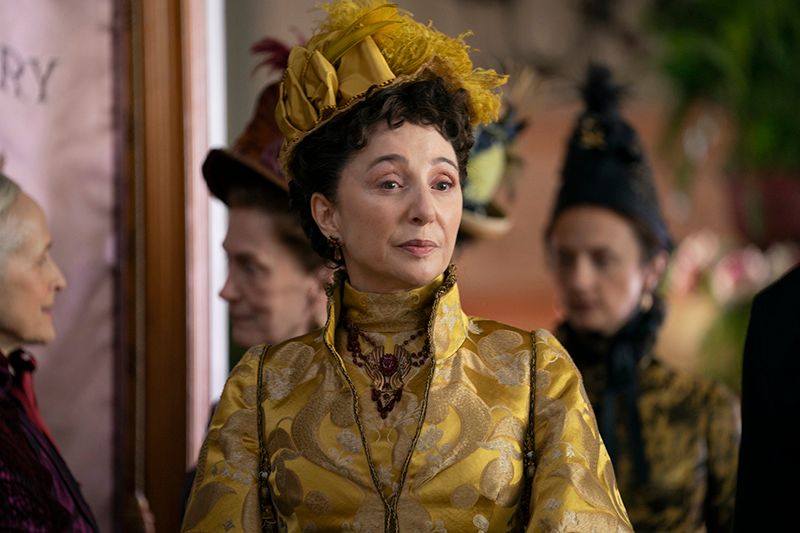
Mrs. Astor is a formidable force in The Gilded Age, as she was in real life. Even her right-hand man, Ward McCallister, appears in the show. In the 1880s, Mrs. Astor was still living downtown at 34th Street and 5th Avenue, in a townhouse she moved into in 1854 when she married William Backhouse Astor Sr. Following her husband’s death in 1875, she made some major renovations, updating the house into the Rococo style of the time. Her ballroom, which could fit 400 guests, is where the famous list of the “400” came from — the guests allowed by her gatekeeper Ward McCallister. Not until 1894, after her nephew demolished his own townhouse to build the original Waldorf-Astoria Hotel next to Mrs. Astor’s house, would Mrs. Astor make the move uptown to 65th Street and Fifth Avenue, building a new mansion designed by architect Richard Morris Hunt (made popular by Alva Vanderbilt).
The interior of Mrs. Astor’s house in The Gilded Age is filmed at the Hudson River Museum, located in Yonkers, New York. The museum was formerly the Glenview estate, and the house was constructed between 1876 and 1877 for John Bond Trevor, a New York financier. In the 1920s, the estate and its grounds were sold to the City of Yonkers, which turned it into a park. The Hudson River Museum took it over in 1948.
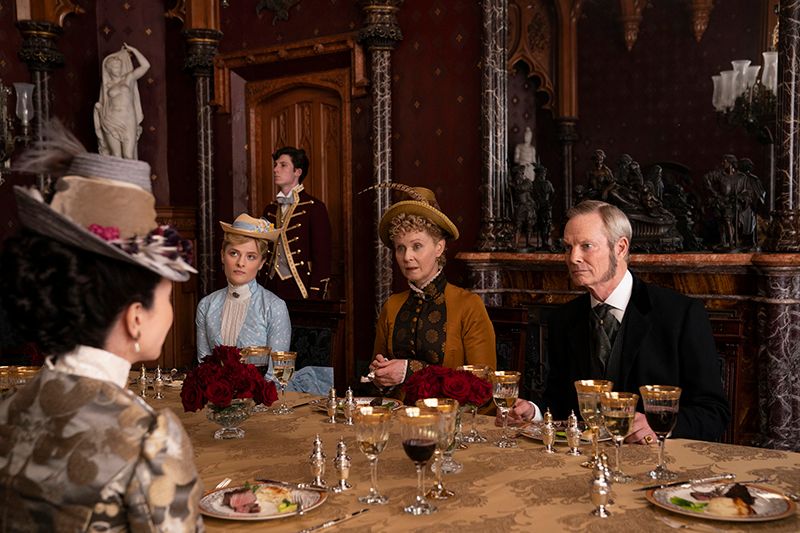
A luncheon Marian attends with her aunt Ada, Mrs. Astor, Mrs. Fane, and Cornelius Eckhart at Mrs. Morris’ house is filmed in one of the rooms in Lyndhurst Mansion in Tarrytown, New York. Other rooms at Lyndhurst are also used for places in Mrs. Morris’ house, as well as a scene where an art auction takes place as a fundraiser for the Red Cross. As described by Emma Gencarelli, the Film, Photography, and collections Coordinator at Lyndhurst, the shooting took place in 2019 over a period of five weeks and was the largest production to date filmed at the historic mansion.
The work to transform the mansion into the set included removing and storing all the existing furniture and protect the walls and floors of the historic house. As part of the production, the Gilded Age set design team actually fixed up some of the wear and tear that had occurred in the house before — an added perk for the museum! As Gencerelli writes for The National Trust for Historic Preservation, “It’s truly a once-in-a-lifetime and thrilling process to see Lyndhurst go from a museum to a living, breathing set for a historic period drama. What was once a static and frozen-in-time space becomes alive with the energy of people, clothing, and objects that so arduously reflect the very history that we as a museum strive to recollect for visitors.”
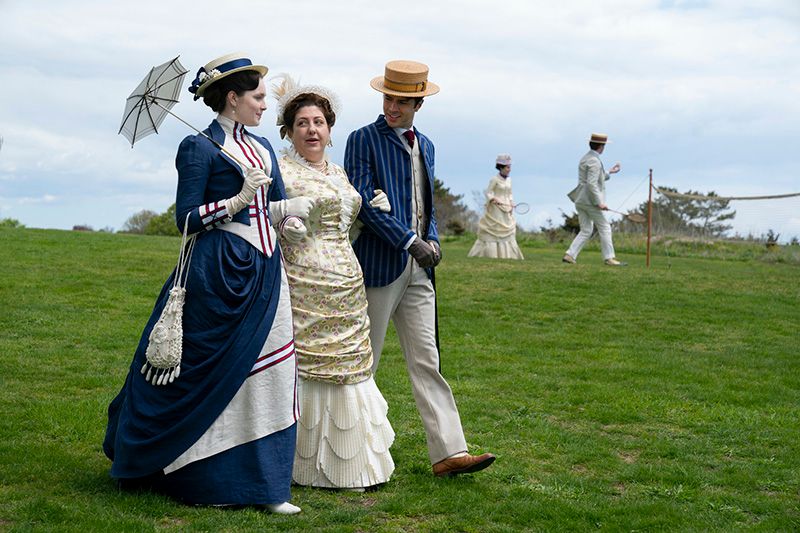
In the first episode, Larry Russell, back from Harvard, attends a party in Newport, Rhode Island at the home of someone from the old money crowd. There, he runs into one of the Astor daughters. It’s his first foray into the society in which his mother desperately wishes to gain entry. These scenes were filmed at The Ledges Hotel in Newport.
In episode eight, many of the characters, including the Russells, the Astors, Ward McAllister, and Aurora Fane go up to Newport for the season. The scenes filmed at the casino, where they play grass tennis, are filmed in the real life Newport Casino which served as the first location for the U.S. Open (it is now the International Tennis Hall of Fame).
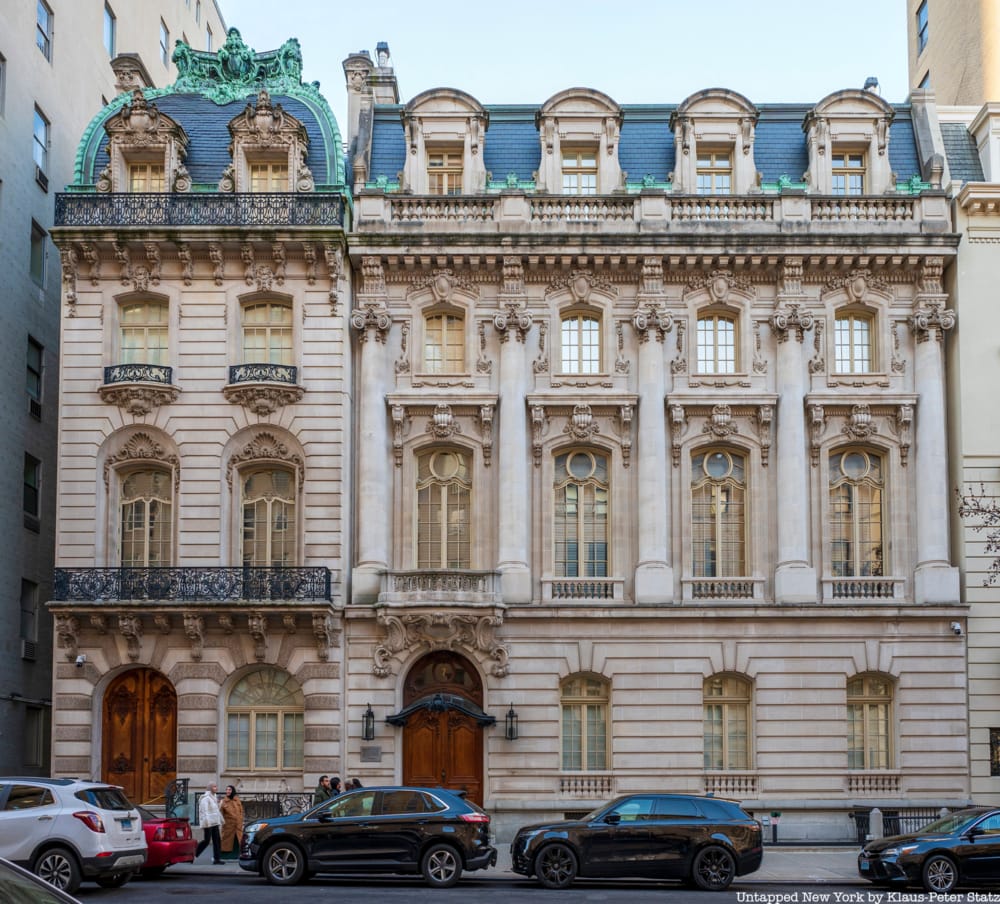
Admire the extant facades of Millionaire's Row and see stunning images of the opulent homes that have been lost while hearing about the scandalous goings-on inside.
You can learn more about New York City’s Gilded Age mansions on our Fifth Ave Gilded Age Mansions Tour! Next, read about the Gilded Age 5th Avenue Mansions of Millionaire’s Row!
This article was written by Michelle Young and Nicole Saraniero
Subscribe to our newsletter